#i like having scenes throughout that show the character's grounded and realistic dynamics
Explore tagged Tumblr posts
Text
Osomatsu-san season 4 wishlist but I get more controversial as the list continues
return of summer kamen
another high school matsu skit
another full length iromatsu skit
an overall increasing of the silliness by 3
more girlymatsu skits (where they're not just supporting characters)
more iyami and matsuzo skits
more outlandish aus/skits (in the same vein as the Inn au, I want them to be completely different people)
continuity, show us nyaas kid and give us a sense of how old these guys are at this point
keep up the gradual, but natural and subtle change in the brother's dynamics (without changing the status quo too much)
a few more straight man jyushimatsu moments, but keep it sporadic so it stays refreshing
LIGHT topical humor/references (i just like knowing that these guys are in the same timeline as us and their world is changing too)
a few more serious moments sprinkled in the mix (like On the Way Home and Just Don't)
#osmt#ososan#osomatsu san#おそ松さん#most people didn't like season 3 for the serious bits but honestly i loved them#i like having scenes throughout that show the character's grounded and realistic dynamics#despite the overall silliness of the show and the outlandishness of the characters ofc#for me. these characters are too interesting not to explore more serious and melancholy topics regarding their lives and their society#but otherwise keep it light
34 notes
·
View notes
Note
I want to understand so bad why so many people love Catching Fire 😭😭😭 idk why I remember getting bored send help I need to reread the series
Pls tell me what makes so enjoyable for you?
i think on my first read the story definitely managed to subvert my expectations; the twist and turns caught me off guard (which makes sense for a 13yo i guess but i like to believe that even for more experienced readers the story went ways they didn’t expect). to me the tension that this book creates is just something that draws me in (a tension that is created by an instability you can find in every aspect of the narrative). because the stakes rise—this is not just a story about an arena and 24 kids fighting to the death anymore. it’s about an entire nation and its people now. the internal politics take up much more space, you can see the oppressive system at work much more intimately because you see that it extends into every aspect of life in panem. it’s every and influences everyone. not even the capitol‘s citizen are exempt from experiencing the consequences of it in one way or another. you see how, intentionally or unintentionally, some are complicit in their own oppression while others, just as intentionally or unintentionally, rebel against it. and then you have the ones that actively fight it despite the threat of violence and death. you see how fear and propaganda are used to ensure obedience but it also clearly shows you how this method of control is playing with fire…. because desperate people have nothing to lose. for me, cf manages to but thg into a context that gives these games even more (symbolic) meaning. and ofc tensions also rise BETWEEN and WITHIN characters. the everlark dynamic is especially delicious to me in this book (some of these scenes are like bread and butter to me i‘ll never get over them). haymitch relationship with both peeta and katniss is so interesting ESPECIALLY when you know how he’s essentially betraying them both in different ways for half of the book. i also adore some of the side characters we‘re introduced to (finnick and johanna mean so much to me <333). and when it comes to katniss‘s inner world i think the tension collins creates shines the most. the first person narration lets you experience katniss‘s turmoil in a manner that has you realise how torn she is between different impulses and wishes and hopes and fears. and that makes so much sense given the situations she‘s finds herself in throughout the book. and ngl her reluctance to engage with this revolution and accept the role the rebels have assigned to her makes her such an interesting character to me. it’s so realistic how she deals with this entire situation. and what’s even more tragic is how realistic it is that friends and enemies and strangers alike us her for their own agenda without ever even really think about if that’s something she wants. because they can justify it as being ‘for the greater good’…..
the plot covers so much ground as well, from the victory tour to the quarter quell, and both just adds to add to our understanding of panem as a political entity. to have them back in the games again is exciting as well because technically things shouldn’t be different but they are, and they are not what you expect, which just adds to this feeling of instability that the book as a whole evokes in the reader. and at the same time there are light and funny and sweet moments this book that don’t feel out of place because they still have a space in this world that’s only at the brink of rebellion but not quite there yet. and these moments just make you feel for these characters even more because you want That for them. you want them to be happy and safe but you know that they won’t be because the scale is about to tip one way or another and you Know their situation is precarious.
idk there is just so much There from a textual analysis standpoint as well. it’s hard to explain why i love it so much tbh. i just think it’s really well written and very exciting almost in an anxiety-inducing way because you’re trapped in katniss’s head and she’s being drag in all these different directions by all these different people without really knowing what’s going on. like maybe my reread thread will give you some idea (it’s by far not everything that stood out to me. the post would have to be at least six times as long to come even close. i mean i don’t think i even mentioned some very basic stuff like the overpolicing and police brutality in district 11—a district with a majority of black citizens). there is also my VERY short goodreads review. i wish i could list you all the reasons this book is my favourite in the series but like you probably realised i am struggling to break it down even a little bit.
#also just to have it said: there is nothing wrong with not getting the cf hype!!! to each their own!!#did not proofread so this is most certainly a mess. sorry <3#anon#answer#mish reads thg#thanks for the ask!!! <333
4 notes
·
View notes
Text
Eliza Jane Brazier Interview
Girls and Their Horses by Eliza Jane Brazier is more than just a book about horses. Readers should think about sports travel teams and stage mothers. Those parents who try to put their own dreams on their children and push them to succeed, even when the dream does not seem realistic. The book explores the world of competitive horse jumping, with overbearing mothers who push their children to compete, toxic coaches, and mean girls.
The story opens with a suspicious death at a horse show. Throughout the book readers are trying to figure out who has been killed since the author does not reveal the victim until late in the story. This adds to the suspense along with other accidents that put some of the girls in danger.
Besides the murder there is also bullying. One of the families, the Parkers, have joined the Rancho Santa Fe Equestrian Center, to make a fresh start. They left their Texas home because the youngest daughter, Maple, was constantly being bullied. Besides Maple, readers get the perspective of her sister Piper, her mom Heather, and some of the other families, Vera, and Pamela. While all appear superficial at the beginning of the book as readers get to know the characters they begin to like and dislike them.
Then there are the men in the story. Kieran, the owner of the center and the head trainer appears to only care about his prestige. Douglas works with the horses and is involved with some of the female characters. The father of Piper and Maple, Jeff, is only concerned about making money.
Anyone who has never read Brazier should start with this book. It is a fabulous story involving smoldering tension, manipulation, poisonous female friendships, and wealthy power dynamics, a depiction on the elite world of teen horse competitions.
Elise Cooper: Are you a horse person?
Eliza Jane Brazier: I live ten minutes from Rancho Santa Fe. I worked in the horse industry for several years as a working student, a rider in a training program, and a riding instructor. I would observe the different dynamics between parents and children, which is what was the original spark for this book. There were some incidents where a mom wanted to pass her dream of riding horses to her child.
EC: Do you think in the beginning of the book the characters appeared superficial?
EJB: My characters might have presented themselves that way. I want to write my characters taking a journey. In the beginning of the book as in most cases when someone first meets a person that person can appear superficial. It is only after the reader gets to know them, spending more time with them, they see the characters reveal themselves in a natural way.
EC: How would you describe Mable?
EJB: Bullied, which affected her. She went along to get along. Very anxious, jealous, with an attitude of woe is me. She idolizes her mom, is jealous of her sister Piper, and feels unlikeable.
EC: You describe the bullying affect?
EJB: Yes. Bullies tease, push people around, and humiliate them. By complaining or showing fear the bullies are energized. I was bullied. The scene in the book happened to me, where someone pulled me down by my hair and threw me on the ground. I wanted to show how a parent feels powerless and helpless in those type of situations. The bullying motivated Heather, Maple’s mom, because she really wants to help her child, but does not know how.
EC: How would describe Piper?
EJB: She is a go-getter, a problem solver, lonely, and tried to hide her feelings about horses.
EC: How about Heather?
EJB: She wants good things for her children and is very supportive. She does not see herself as a good mom. Heather is affected by being abandoned as a child. She has not dealt with her past and is not happy in her marriage. By marrying Jeff, Heather thought she would be safe and secure with him, someone to count on. They never had any romance or love in the relationship. Her focus is on making her children happy instead of making herself happy. Heather has lost herself as a person.
EC: What about Heather’s relationship with her daughters?
EJB: She can be pushy and controlling. Eventually she realizes this and tries to back down. Her journey is the backbone of the whole book. The premise is a mom’s influence over their children and how they should yield it. No parent should be completely hands off yet should not be domineering. The other mom, Pamela, lets her daughter Vida do whatever she wants and then there is Heather, who tries to figure out where she is as a parent.
EC: How would you describe Vida and her relationship with her mom?
EJB: A bully, self-centered, devious, basically a complete mean girl. Her mom Pamela related more to Maple than Vida.
EC: Can you explain why the mother quote?
EJB: You are referring to this one. “You would worry and torment and impact your kids for the rest of their lives. They would blame you for everything. They would blame you for nothing.” I have eight brothers and sisters, with thirty nieces and nephews. I get to observe many different dynamics between parents and their children. As people get older, they realize it is not about a right or wrong decision, but which decision will be the least harmful. With parenting the consequences are huge and somewhat scary because it affects someone’s life. The characters in the book have a complicated relationship with their parents.
EC: How would you describe Kieran, the owner of the Equestrian?
EJB: He thought himself of G-d, is obsessed, narcissist, manipulative, controlling, and intimidating. All that mattered to him are the horses.
EC: He abused humans, but did he also abuse horses?
EJB: Many readers who are not familiar with horses might think he abused them. ACE is a commonly used horse tranquilizer, which he gave the horse Commotion. It is something commonly used. It is administered to calm a horse, especially after an injury. ACE is a mild sedative. This does not mask a horse’s injury.
EC: Douglas played an important role in the story?
EJB: He was confident, patient, sensitive, passionate, and charming. But he was also desperate to be loved.
EC: What was the role of the horses?
EJB: They are beautiful and smart, powerful, and can help someone. I put in this book quote, “Anyone that did not believe in magic, had never written a horse.” The horse Commotion brought Piper out of her shell, but also created jealousy among the girls. Through Commotion everyone projected their dreams. Maybe Douglas and Piper appreciated the horse as a separate being, but they also wanted to see how they can achieve their dreams through the horse. Both looked on the horse as a friend.
EC: What about any movies/TV shows?
EJB: There is something in the works.
EC: Next book?
EJB: I went into a different direction. It is about a guy and gal who meet on an overnight sleeper train going from Florence to Paris. They have a flirtation, but he disappears. Both are contract killers. It has murder, romance, and adventure. It should be out the end of the summer next year.
THANK YOU!!
0 notes
Text
Why 'Pizza Delivery' IS The Best
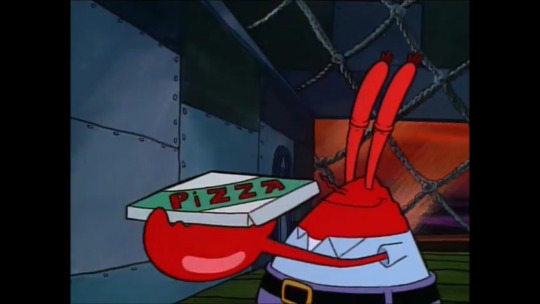
Many moons ago, I talked about Band Geeks, an episode of Spongebob often proclaimed as one of the best episode in the series. Then again, in the back of my mind, one other episode stood out as what could arguably be the true number one. One episode iconic in the character, the story, the comedy, the emotion it has for a mere 11 minutes, and I wanted to talk about all this myself. We're seeing how Pizza Delivery is considered The Best. Let's do this...
The Pairing
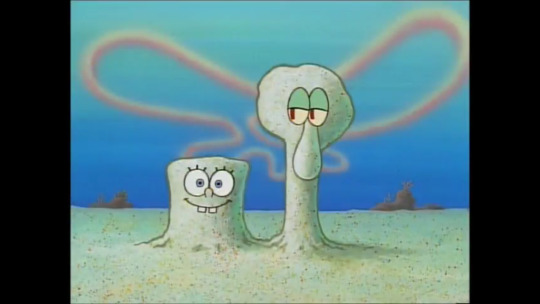
The episode's setup is honestly so simple, it's driven me stupid. Out of every episode, this magically gives us the Krusty Krab pizza, a platinum item of Mr. Krabs that's never been replicated since. Mr. Krabs has Spongebob join Squidward in the delivery when he didn't really need to. Squidward could very well have told Spongebob to go away, leaving it to him, but it makes sense that Spongebob would be so dedicated in his job enough to go. It especially helps that this is the first and earliest episode of Spongebob and Squidward working alone together, their clashing spirits being the focus throughout. It all adds to the greatest dynamic where Squidward puts up Spongebob's antics believing it to be a simple job, both ending up tastefully dumb in their own right. The episode would not have work if Squidward was more bitter about everything or if Spongebob acted too aloof. It has the perfect blend in character where the dichotomy between the two is so grounded. Which leads well into...
The Comedy
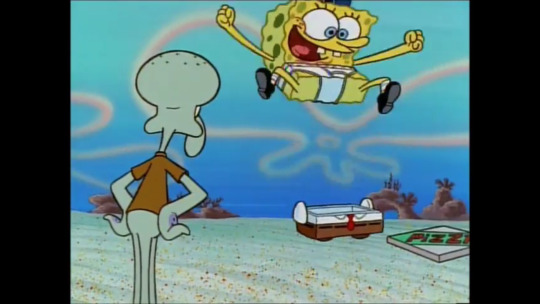
With the character dynamic comes the great, memorable comedic timing of Spongebob and Squidward bouncing off each with their conflicting outlooks. Squidward is very much defeatist, willing to give up at the drop of a hat and is in disbelief of anything working out while Spongebob's the opposite, keeping his chin in spite of everything looking not in his favor. I'd say this is amplified with how you can see it. The episode doesn't shame Spongebob and/or Squidward for how they perceive the adventure, them being an extension of the child and/or adult audience. They're both a couple of dudes in the same situation and they run with this this in the best way with every moment. There isn't a single joke in this episode that doesn't appear to work within the confines of their chemistry. Everything they do, everything they say is in line with who they are, and it never amps up their personality to get the considered best laughs. My favorite bit being...
The Pioneers
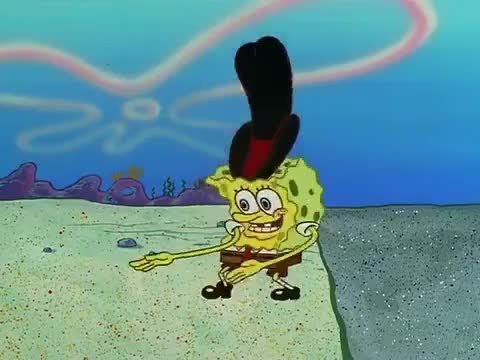
Everything with Spongebob's enthusiasm for the pioneers on their journey hits every time. It's fitting not only with the point of the episode, but Spongebob's character overall, a sponge never afraid to express the ways to get the job done. Fact that Squidward follows along until it backfires at him is all the better, leading to my favorite Spongebob joke where we finally get the best vehicle in the game. The Rock is the one off joke you can't help but be with Spongebob and find joy in something so stupidly simple. It's on par with the Paper episode, the fathomable length of imagination just makes a man smile every time I can think of this one joke. But with this riding high comes one of the most devastating scenes in Spongebob.
The Customer
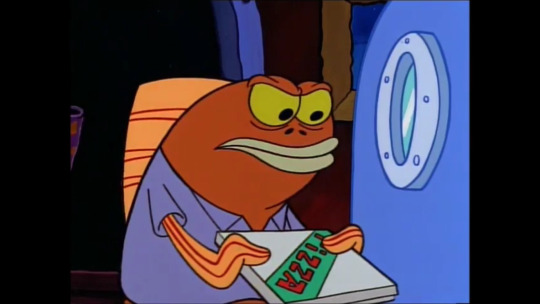
There's a bit of a balance when it comes to when Spongebob finally delivers the pizza himself only to get rejected just because the customer didn't get a drink with it. The guy never comes off as tastelessly cruel despite being one of the most despicable characters in the show's history. He's a character you can enjoyably hate. It's remarkably unfair, but never feels out of place because there's a rarity that customers can genuinely be like that. For an episode so early in the series, it's one of the rawest moments to see Spongebob be punished for something he didn't see coming. It's hard to truly wrap the brain around the customer's sudden volatility, but it's nonetheless effective in breaking our pluckiest character.
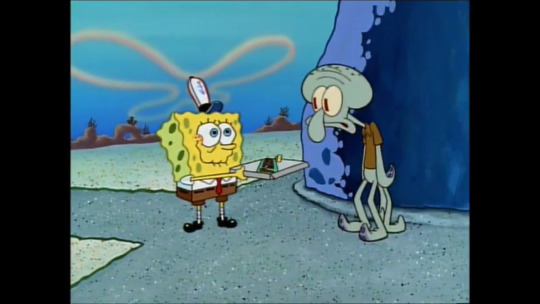
This moment is really something. It's not the first time Spongebob is sad or breaks down, but it's the first time Spongebob gets emotionally beaten down by somebody else. While Plankton in an earlier episode makes him tear up, for a quick moment this one rando managed to kill Spongebob's spirit entirely and you feel it. Not even Squidward managed to do this regardless of how much he might've resented Spongebob, at least not yet in the series, so it's all the more fitting and impactful that he would see his coworker at his genuine lowest. It's definitely enough for Squidward to make his most memorable stand.
The Squidward
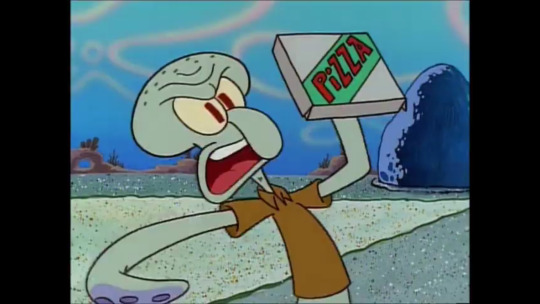
Squidward Q Tentacles rarely gets moments where he truly stands up for Spongebob, so it's great and natural that this is the first. Even after everything in this adventure, Squidward never really hates Spongebob's optimism. Heck with many great episodes centered around the two, Squidward never despises Spongebob's outlook but feels it's unfair that he can live hapless while Squid feels like he can't whenever he tries. At his best, his cynicism is realistic enough for those who grew up with the show to find him the most resonating character. Which is why when he sees Spongebob broken, in tears, he goes to set things right.
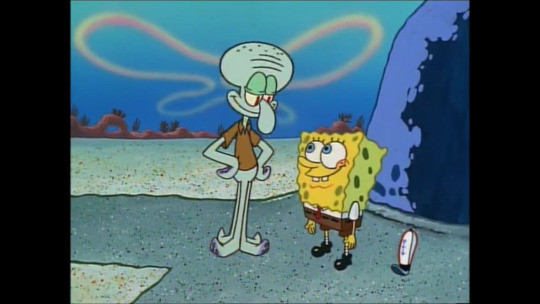
It's one of the most gratifying moments of Spongebob and I couldn't imagine it going any other way. It really brought the nuance of the two's relationship to a great direction, I say letting those who grew up with Spongebob ponder how Squidward saw his friend. Even when the episode immediately ends with Spongebob inadvertently soiling Squidward's moment with the Krusty Krab, it was nonetheless satisfying along with everything else that happened.
The Conclusion
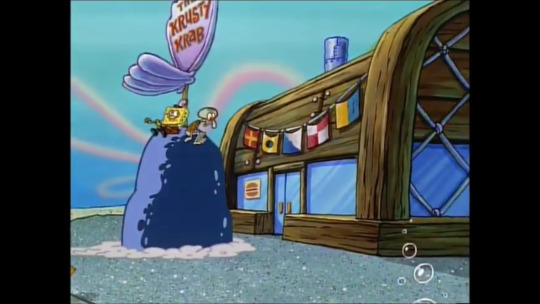
Everything about Pizza Delivery feels perfect, around the same height of perfection as Band Geeks. While we aren't with many characters, the moments with Squid and Sponge are at their most realized. Spongebob overall is a character comedy and this episode is a testament to that where we see the two at their best and funniest. Not to say this was where the show peaked, god no, but this episode really paved the way for Spongebob to be as iconic as it is now. Both as a kid and adult,
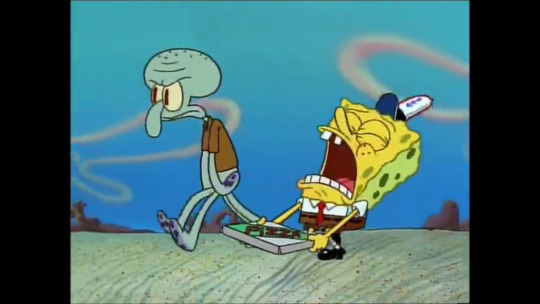
it never ceases to be the Best
#Pizza Delivery#spongebob squarepants#spongebob#spongebon squarepants#Squidward#squidbob#nickelodeon#cartoons#analysis#awesome#long post#Good Stuff
213 notes
·
View notes
Text
The Art of Subtlety in YSBTLF
Now I have yet to really talk about Betty and her development. Currently I'm on the episode where Betty goes to the bank to secure a loan through Terra Moda and it got me thinking.
Slowly we've been seeing the change from Armando's behavior towards her. Now it's been very subtle. One of my favorite scenes that display's the subtlety of his behavior is when Betty and him are being driven around by Don Hermes.
Right as they are leaving the building where they went to sign some documents to start the process of Terra Moda seizing Eco Moda Betty and Armando are talking.
She often jokes about her ugliness and as a person who in society has been outcaste by the mere fact I'm fat, I get that. We don't use it as a way to downplay our worth, better yet to find the humor in something that hurts us deeply. This is something Betty does often. Usually Armando agrees or goes along with it. The scene however caught my attention because after Betty jokes that she didn't get hired due to her ugliness she laughs and walks away and Armando stays behind and nods slightly, as if understanding that her ugliness could cause that BUT we then hear Don Hermes lovingly say "My beautiful daughter, did everything go well?" and Armando's face lights up. He sports a slight smile and stares at Betty as she laughs and tells her dad that everything went well.
The more I watch this show the more I realize that we see a lot of contrast between Betty and Armando's personal lives. While Betty's parents are very present in her life, constantly at the fore front of her ethics and morals as well as there to keep her grounded and realistic, though at times one can assume over baring and over protective, her parents love her deeply and you can tell. They treat her as their most precious possession.
However Armando's parents are a different story. His father always expects the worst of him, his mother coddles him but with conditions. His parents are only ever shown or involved when it comes to the company and/or his relationship with Marcela. Often when they do talk it's always about the company or again the relationship he's in with Marcela. It never goes more than that. We don't see them interact outside of that which causes that parental relationship to seem cold and distant. Kind of like a trophy child. Not really there to celebrate or show love when times are bad. Just there when things are on their terms. They show more interest in Daniel, Marcela, and Beatriz than they do to Armando and even then it's not saying much. In shorter terms, they suck.
So this scene in particular is one of my favorites for that reason. We see Armando, who at first was annoyed and being all pipirs nice to then engaging in conversation, joking, and letting his guard down and that's the thing. Often we see Armando with his guard up but around Betty slowly we begin to see him let his guard down.
Now in particular the reason why I bring this up is because from the get go I've always been interested in the complexities that Armando's character offers, but Betty is this different story. While Armando is complex in dark ways, Betty is complex is light ways. Her complexities aren't a form of harm rather a form of self preservation but still seeing the best in people, while Armando's complexities are in self preservation at the cost of others.
They both struggle in a sense with self worth. While Betty's self worth is rooted in her image and the way society treats her due to her not being societies beauty standers, Armando's self worth struggles are deeply rooted in his person's worth. Meaning that he doesn't find himself worthy as a human if he isn't succeeding, which makes him extremely arrogant. Betty's insecurities make her extremely humble and though being humble isn't a bad thing when there is no balance, her self worth is to the ground and due to this she allows people to step all over her and she often is a people pleaser because of this.
She lets people push her around and doesn't stand her ground when people are rude to her about her appearance. She does when it comes to her work but not as person and because of this she begins to idolize Armando because, unlike everyone before, he sees her as a person, when it comes to work.
This draws the lines, clean and crisp lines.
At work Armando defends her. He defends his decision to hire her. He defends her degrees and her experiences as an economist. This means a lot to her, because as mentioned before, she wasn't getting hired due to her "ugliness" and here comes a man that looks past that and hires her over the pretty one. We understand Betty's crush. We understand why she begins to idolize him even though he shows really crappy behavior at times.
First he constantly yells at her, laughs behind her back, allows his best friend to secretly see her as if she were this attraction in the tent of strange and ugly phenomena at the circus. To then being subtly annoyed when certain people mock her and make fun of her, though this gets him half points because he still allows his best friend to do this.
To end my analysis of Armando's behavior towards Betty up to this point I'll say that as this continues Armando begins to soften up towards her and while no one else picks up on it, Betty does. Which feeds her idolization of him.
Up to this point of the show Betty has been unconditional, even when she has needed to set aside her true feelings for him, she places his before her own. With Claudia, instead of ruining his night she stayed in the room all night long to which later we see Armando feel guilty over it but he gets no gold stars over that. That was a dick move.
Betty constantly shows loyalty, unconditionality, support, and most of all, team work. When he fails she always places herself to take the blame with him. She doesn't let him feel alone in his failures. Betty truly shows to love him. As a friend, as her boss, and as a girl who idolizes him and this moves him because to this point Armando hasn't had that. His parents do not show him unconditionality. His fiancé shows no team work or support and his best friend... he sucks. He is a terrible friend. Here is this girl who gives him all of this and for what? She doesn't ask for anything in return except to work for him. That's why we see the subtle change in him and Betty deserved that and more.
When they went to that cocktail with RagTela, where Armando started to hit on Ms. Colombia, I forgot her name, Betty doesn't seem jealous or hurt by that. In fact she seems unbothered and stayed in her lane, once again the lines being crisp and clean. However later on, when Betty tells Armando that they've got a meeting with Macro Textil and she sees Armando's face light up and ask how he looks, we see a subtle change, jealousy. She showed some of that with Claudia but Armando probably interpreted that as Betty being frustrated that due to that she had to sleep in the office that night. Here he doesn't pick up on it. She laughs dry only to cover her tracks and gets the man his cologne and throughout their meeting with Macro she shows to be a good wing-woman, minding her business of course.
Now let me skip some scenes. They're trying to negotiate a payment plan with Macro Textil. At this point what Armando has said isn't very convincing and Betty steps in, our bright Betty manages to say stuff that makes them think over their offer. At this point Armando has had all eyes on Ms. Colombia but he turns to watch her, with a slight smile on his face, a brief second of staring at her lips and completely absorbed into what Betty is saying and doing.
Now I want to bring us back to the main scene of this post. Betty sitting across her old boss. We have seen two scenes of her old boss and her interact before. Not only to drive the plot, but I believe to show the difference between a boss who was fond of Betty, after all he did say he was happy and pleased to help her with Terra Moda after being her boss for two years and a boss who is... more than fond of her but confused about it(to be fair Armando is so stupid when it comes to feelings the dude isn't even aware he's got them to begin with.) Betty's behavior is respectful and friendly towards her old boss. You can tell she's comfortable talking to him and so on and her old boss is the same. He's respectful and friendly towards her.
Why do I think this is important to the plot of the story?
It got me thinking. When I was working I got pretty close to my manager. He was married and older than me and we got along great. We talked, we joked, we had work discussions and we'd talk about life and stuff. However it was always very respectful and friendly, like a boss and their employee. My manager was very gentleman like. He didn't let me carry heavy stuff(As a fat woman I'm not used to that lol) however the line was there, Boundaries were there. Obviously we didn't have conversations that were too personal or even that personal at all. I could see Betty and her ex-boss being the same. A simple boss to employee friendship but if I had a... ship of sorts with my boss like Betty does with Armando my sensors of red flags would be blaring.
Think about your greatest friendship with one of your bosses. It's respectful and friendly but you don't cross lines, right?
Now I keep comparing their behavior to my manager's and mine.
That is why they show us, unlike with all the other Banks Betty has talked to, their interactions. To show a clear and distinct line of work related ships. Her ex-boss is truly fond of her but he doesn't cross boundaries and neither does Betty.
My ex-manager was respectful and we talked like an older brother and younger sister would. That was our work dynamic.
Betty's behavior has always been respectful and friendly towards Armando. Their work dynamic has been that she's the smart one and he's the pretty one and it works for them.
Betty's emotions start to blur when Armando's behavior towards her starts to blur. We go from seeing back to back scenes that show separate life styles and personal lives to having them blend in and once their personal lives begin to blend in so do their work lives.
During this day, before Betty goes to talk to her old boss, we are shown the scene when she tells him that Macro Textil was on their way to sign a contract with them that very day. Armando is between Betty and Mario and he talks to Betty. Constantly saying "Betty we did it!" and things along those lines but after each sentence he goes to Mario and repeats the same thing up until he goes to hug Betty.
[EDIT: This allows us to view Armando's personal dilema. Your brain often blurts the first thing that comes to mind and seeing as Armando isn't that bright when emotions are involved, he blurts out the first thing that comes to mind and that is Betty. His first thought is to talk to Betty, to celebrate with her (since she is the reason why that business deal is even happening) but he is prioritizing her, picking up on it and then going to his best friend to celebrate it as well. It shows us subtly the change in him.]
He doesn't even do that to his best friend. Once again, the lines blur. Armando is the first person in this work related relationship to blur the lines and Betty follows suit.
Yes, the hug was work related. Yes he was excited over the fact they could release the new fashion collection they'd been working on BUT he hadn't done that for other deals that they had managed. He didn't do that with the first collection he launched. He's hugged her, up to this point, two other times. Once after the meeting with Daniel where Betty gave him lessons on economics and later when Betty was crying.
This is their third hug. I'm not reading into that hug but what follows before and after.
As I said when writing we're told to keep what drives the plot, character development, and overall story; everything else is thrown out the window. So these subtle changes, behaviors, and quirks we begin to see coming from Betty's interactions with Armando explain why it was so easy for her to be manipulated by this man. They are important because they are meant to show us what is okay and what is not. What is normal and what is not and in small ways their work dynamic begins to shift and the first person to do that is Armando.
because he didn't feed the illusion of love when that sinister plan was created, he fed it when he started to get confused about her. When he started to blur the lines.
Betty didn't just idolatrized him because he defended her work. She did it because he fed her feelings towards him. When Betty showed loyalty he showed to be more fond of her. He went from constantly yelling at her, being indifferent towards her, to trying to watch his tone and temper. When Betty showed unconditionality he showed kindness. When Betty showed support he showed loyalty and little by little we begin to see these two blur the line between personal and work.
The changes are really subtle that they fly over your head but when you pay attention to the actual story and not the romance you can tell when they start and that is one reason why I love this novela because very much like real life these changes are subtle.
Betty's love was really subtle and you can pick up on when she starts to fall in love, whereas with Armando his change goes from being so subtle that you're confused yourself to it being so bam in your face you can't deny it.
In any aspect their relationship begins to blur during these episodes and the clear contrast of that is with seeing Betty interact with her old Boss at the bank.
In the future episodes this theory is proven right when we no longer get clear cuts of scenes that show the difference between their personal lives better yet we get a very muddy and blurry view of their personal and work lives.
Betty's moral, ethics, and emotions begin to change when Armando begins to change. Up to this point Betty has been consistent with her morality, though close to stumbling her father has been there to keep her on the right path. She has been the sweet and loving person she's always been but her character has been consistent up to this point and it's important to note that and why everything that happens after this is the way it is because as an audience we have been warn over and over again and so have these characters but just like in real life we don't always pay attention to the subtle changes until their domino effect starts to make too much impact.
also sorry if this doesn't make any sense it's currently 6:40 am and I've been writing this since like four lol.
#ysblf#beatriz pinzón solano#betty la fea#yo soy betty la fea#don armando#armando mendoza#analysis of ysblf#armando ysblf#betty pinzón solano#betty ysblf#don hermes#nicolas mora#marcela valencia
85 notes
·
View notes
Text

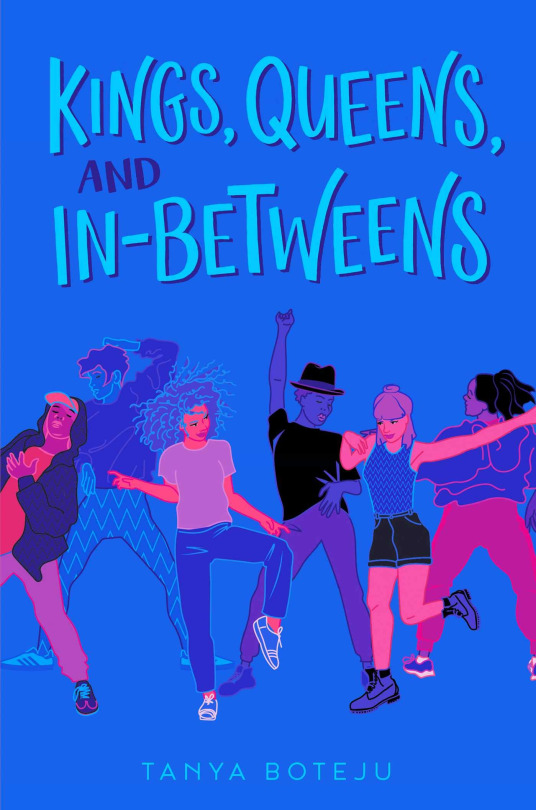
I can always appreciate a story that has the greatest summer vibes, where there's this great sense of freedom and you can reinvent yourself, which this book has in spades. Nima's journey is a crazy one full of family drama, romantic woes, and the utter sparkly whirlwind that is the drag scene. Throughout all that, though, it feels like such a grounded story and it's written in a voice that feels so honest and open. Nima's just a little bit awkward, a little bit guarded, and has just a little smidgen of gay panic when it comes to girls and, yeah same. The book doesn't really have any major rises and falls in terms of plot, it's just a nice character driven story set at an easy steady pace.
And oh my god, Deirdre, Nima's wonderful fairy dragmother is just a delight. Usually I would question the decision of a teenager letting an adult crash on their couch the night they met, but Deirdre gets a pass since she's a ride or die friend. She's such a wonderfully supportive figure who is loud, proud, and everything great in between without being forceful and constantly comes from a place of understanding.
Another thing that usually gives me pause in stories is age gaps between love interests, though I think here it's somewhat tolerable. I don't think we're ever given a definite age for Winnow, Nima's crush, but it's clear that she's older. For me, it never seemed like Winnow was trying to coerce Nima into a relationship, nor was she tapping into a power dynamic and was always checking in with Nima to make sure she was comfortable. There's a moment later in the book where Nima encounters someone a bit more manipulative and yeah, that got a bit too uncomfy for my taste. But, overall, her and Winnow was not the most egregious age gap romance I've encountered.
The book is chockfull of representation, whether through sexuality, gender, ethnicity, it's fairly diverse which made everything feel all the more realistic. It's a book that's a celebration of queer culture and identity, where sure there are moments of homophobia and intolerance, but that all gets drowned out when our characters are easily met with acceptance by so many others.
There are some plot threads that ultimately end up fizzling out in the end, resolving either somewhat quickly without too much focus or are simply not brought up again. The book tries to take on a more realistic tone with this, showing that life is messy and not every part of our lives is going to have a happy ending, but there were a couple of points I wish we got to see get some kind of conclusion.
Ultimately, I would love to put this book into the hands of the younger people of the LGBTQ community, as I definitely needed something like this was I was that age. Just something so full of queer joy and self discovery.
#tbrbusterchallenge2022#bookbanditchallenge#kings queens and inbetweens#tanya boteju#lgbtq reads#lgbtq ya#reading challenge#reviews
6 notes
·
View notes
Text
TV Series Review: Miss Scarlet and the Duke (2019)
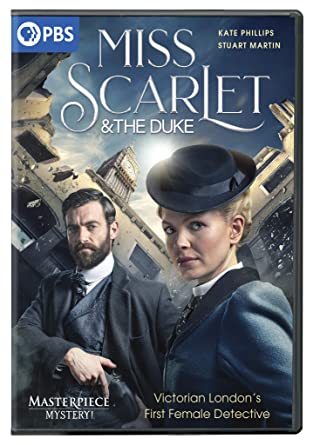
Genre: Historical Fiction/Murder Mystery/British Period Drama
Rating: 10/10
TV Show Review:
I. LOVE. THIS SHOW.
Pretty much this review will be me talking about everything I love this series, just a warning. I hope you love it too, so you can enjoy my blabbering and gushing!
I will do this review a bit differently, since it’s still relatively new, especially here in the US. I’ll talk about my general thoughts, and then I’ll do a “keep reading” when it goes down into spoilers for each episode.
So, here, for the spoiler-free part of my review:
Let me start out by saying that these characters make the whole damn show. Yes, the mysteries are great and all, but it’s the characters in this series, for me, that drives the whole thing. Eliza Scarlet is a masterful main character, and I love everything about her—from her determination, her willingness to fight the crowd to be what she wants, how she’s willing to admit some issues, that she still relies so heavily on her father after he passed away. Her humor is so incredible, and I think she’s just someone I wish I could be. Her feistiness is so wonderful. And then our Inspector Detective William “the Duke” Wellington is… one of my favorite leading men, fictional of course. I like that he’s overprotective of her (sometimes, to funny extents), that he does his job well and follows a lot of the right paths, that he doesn’t seem surprised by much of anything, and that he’s willing to fight even when he’s falling apart at the seams. And their relationship! They are so clearly in love with each other (probably have since that “chaste kiss” when they were teens…), they bicker like a married couple, and though they annoy the living hell out of each other, they would die for one another. I like that their relationship isn’t perfect and they take note of that in the show, but it feels real. It’s one of the most real relationships I have ever seen.
Moses and Rupert are such important characters and I LOVE their relationship with Eliza, their friendships that seem so different, but they just fit. I can’t go much into detail about either of them, or it will spoil entire plotlines of mysteries, but I will say that I love what the story does with their characters, how it gives them breaths of their own, that they become some of the most dynamic characters in the show with so much to them and that take a life of their own. That they feel real and important and interesting, and I love the representation. That’s all I’ll say about them in the spoiler-free review.
Now, the mysteries, were incredible. They kept me guessing through every episode, and I would have some feelings about things/people, but I wasn’t sure how it would get there. At times, I thought of the truth, but figured that they were going to trick me with it (my grandpa always told me that I have a brain for a detective, if I had some training, so that’s fun!). But still, they were so innovative and different from other mysteries that I had experienced. And I liked that each episode felt a bit different—we had a taste of ghost story feeling, even an intense thriller. They were really, really good mysteries, to me at least. And I do love me some mysteries.
Okay, so the costumes, sets and music. MY GOD. It was all SO BEAUTIFUL! Eliza’s clothes were magnificent and they had POCKETS!!! William was way too sexy in those clothes (can we bring those back??? We can leave out the discrimination that came with the time period, but let’s bring back the clothes at least!). Everyone had gorgeous clothes. And the sets were beautiful—those dirty, Victorian, coal covered streets… I loved it! (My mom says she’s not sure why I’m so in love with the dark atmosphere of the Victorian era, but I am!). The MUSIC. Can they just upload a damn soundtrack already? I need to listen to this music all the time! It sounds different and cool and I’m just so in love with it.
THE HUMOR! My god, I had never seen a murder mystery show set in another time that does humor so well. I love how they travel between scenes to make it funnier, the lines they say to one another. It makes me feel like these actors absolutely had a blast filming this show. They were so on point, and some of the funny scenes made me laugh harder than any comedy movie I’ve seen.
As you can see, I’m obsessed with this show altogether. I love it, and I want to watch it over and over. The vibe, the love stories, the characters, every. single. thing. is my jam. I know they’re planning a second season and I cannot wait for it. Ugh. My god. It’s wonderful.
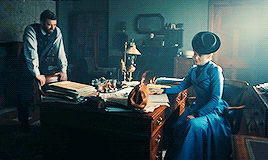
So here ends my spoiler-free review. After this, I’m going to talk spoilers. So if you have seen the show and/or want to read the spoiler-y thoughts, please click on the “keep reading.” If not, see you around after your watch the show! It’s well worth it!
Let me start out by explaining more of my thoughts on the relationship between William and Eliza, because I worried that some of what I had said would give away possibly too much. So here’s that part:
The (hilarious) way that William mutters “oh jesus” whenever he finds Eliza waiting in his office, or the fact that Eliza calls herself his wife (or in one instance, something worse, but to save herself) to get what she wants also feels like a sly to personally agitate him. How that he would toss her into jail/into court when she went against things he said she shouldn’t do (though he released her/got her out at some point) never got old and even funnier to me each time. I told my mom, she was like a toddler—he couldn’t keep her in sight, so he had to lock her out. But I liked that she still argued with him despite it. Their back and forth was perfect.
I will say here, that I have seen people’s comments online how they wish that William was more on board with Eliza’s detective dreams and support her 100% much earlier on. And I get that, that he can seem like an ass at times. But honestly, I think he feels more realistic that he’s a little harder about it in the beginning. Trust me, I love this show and the way they play with characters and storylines, and that they are so forward (I mean, Eliza is so forward-thinking and modern, it’s amazing), but to me, if they made EVERYONE, i.e. William especially, it wouldn’t ground me into the time very well. I like that it was more gradual for him, to fully support her. And actually, I think for a man in the Victorian Era, with his position, he supported her as much as he could. Though he fought her on it at times, he eventually gave up trying to stop her. And I do think, in some respect, he was trying to protect her, because he does care for her. He was a man of his time, in his position, and he is changing. Can we at least give him that? Because, in all throughout history, it took a while for things to change. And it was men like William that started to understand, that started to recognize that, that helped make it happen. Plus, Eliza didn’t let him pull shit all the time, and she did fight him on it.
Now, I’m going to comment on each individual episode with my thoughts. I’ve never done this before so yay! Here it goes!
EPISODE ONE: Inheritance
I knew the weird uncle wasn’t the girl’s uncle. I didn’t expect that it was her husband (I should’ve!! We knew he was a cheat and a conartist!!), but I knew it wasn’t her rich uncle. I knew from the moment he came on screen—I remember thinking, this guy looks too young around his eyes. His beard and mustache look fake. So, I was right to an extent.
I can’t be the only one who was horrified to discover what the police did to women who worked as prostitutes or in dance halls—they could be arrested and searched for venereal disease? Seriously??? For men who were so obsessed with wanting their wives to “stay safe” and “be protected,” they sure were fine with flipping the case when it came to women that they would also gladly pay to sleep with? Why don’t they check the male clients who are PAYING for this industry. It was appalling and horrendous, and it made my skin literally crawl as they tried tying Eliza down to the chair.
On the note of that scene, Eliza calling herself William’s favorite whore to save herself is literally one of the funniest (though, darkly) things—especially in the next scene, when you see the two of them sitting in his office in silence and William is mortified, annoyed, and I think amused at the same time.
I loved how Eliza tricked that bastard husband—she set him up, AND she gave him laudanum to make him pass out? This woman knows what’s up!
Instantly from this first episode, I knew I loved this show and these characters. Eliza shows her charm and wit and humor and smarts. She’s skilled and I love her personality so much. Though I can see how she could be aggravating to others. William absolutely adores her. Rupert annoyed me a bit at the beginning, but by the end—when he asked Eliza to not marry him, I knew I would like him. And Moses! A Jamaican man brings in the race question of this dark, old world, but I love that he likes Eliza and finds her interesting. He’s terrifying, but I think he’s a good, decent man, he’s only trapped in this world because no one will let him be anything else. But he’s such a rich, interesting character.
EPISODE TWO: The Woman in Red
This episode brings in the reality of homosexuality in this world. That it has always been there (damn those bastards who think otherwise), but it has been hidden away. That men and women have to fear for their lives, and also marry people they do not want because they want to not be noticed. I loved finding out Rupert was gay—my mom called that one!—and the friendship he develops with Eliza. That he trusts her to tell a secret that could literally have him killed and ruined. And that Eliza doesn’t even blink, that she’s willing to keep his secret to the grave, and I cried when she basically told him that. It’s quite beautiful that Eliza even seemed to be grateful that he trusted her enough to give her that secret.
Which was used in interesting juxtaposition to the gay man, accused of murdering his lover, and his wife. I understand the woman’s hurt, that she loved this man and it turned out he didn’t love her in the same way. But that didn’t mean her willingness to let him die for a crime he didn’t commit was at all good or called for. With Eliza talking her down, to prove that the woman’s husband was innocent, I think proved that though she was hurt beyond reason, she did love that man who was her husband and didn’t want to see her die. It’s really a hard situation, especially during that time, when people were constantly shoved down their throats that homosexuality was bad. Not that I’m giving her a “it’s okay,” but I can understand the pain and confusion she went through. Especially because she pulled through.
Through this whole episode, we thought it was the wife that had murdered the lover (the other man). I was surprised to find out that he had killed himself, cut his own throat (which I had heard wasn’t possible to do—but my grandpa, who had worked as a detective, told me that is a myth people talk about, that it’s really easy to cut your own throat). That was a shock, and it made me so sad. That he was dying because he was unhappy, because he hated what he was, because of damn society telling him so. I actually started crying, because as someone who is bisexual, I would be condemned in this time during for openly being with men and women, though I couldn’t even compare to people who are gay or lesbian, because the situation is not the same. But I could connect, I could understand. And I hated knowing the pain all those people were in, that a man had killed himself because of what he was, and that another man had to live with that. It truly breaks your heart.
William’s response to finding out the dead man was gay was interesting. I thought his comment “in my line of work, nothing surprises you” funny, but also telling. He didn’t act disgusted, he didn’t mistreat the husband when they questioned him afterward. The show didn’t directly say his thoughts on homosexuality, but I got the vibe that he was “whatever” about it. Like he knew it was there, and he wasn’t condemning it publicly. That gives him credit, in my book.
Another great episode that got deep and beautiful.
EPISODE THREE: Deeds Not Words
Is this show just obsessed with getting right down to modern issues that were also faced in this time, but not as strongly discussed? Because I’m all for it! This episode was all about the suffrage movement. But I liked the take they did on it.
Yes, they spoke out about the treatment of women. That men, white men, controlled this whole world. But I also thought it was interesting that they made this main suffragette not the greatest person. It made everything complicated. Like, everything she said to Eliza made sense, and I found myself cheering with her. But she shot a man in cold blood, she was willing to bomb a whole building of men—even though it seems justified because of what their club represents.
I think this episode was discussing the balance. That there can be change, but when you attack the people who you are trying to change, it may not work in your favor. At least, that was the vibe I got. Not to stoop to their levels, to become just as horrible as them. Her ideas and words were great, but her actions were a bit… skeptical.
Eliza and William’s response were interesting as well. Eliza felt a passion for the cause, William thought it a bit extreme. But, to me, by the end of the episode, they had a common understanding, they had reached a comfortable middle. I think, this show was showing that was how change came. People seeing eye to eye, and then it spreading from there. Of course, William has faults, but I think he’s truly trying. Especially with each episode. And the more Eliza and he grow.
EPISODE FOUR: Memento Mori
We got our ghost episode! I wasn’t even expecting it, it was incredible! A ghostly image of a dead wife that had killed herself reappearing in photos? How wild and cool is that idea!
I didn’t know that the Victorians had a thing where they took photos of their dead loved ones, looking like they were alive (y’all, the Victorians were obsessed with death…), but it’s an interesting concept. Maybe even sweet. I get what they were trying to do, even if it did seem morbid. How I feel about it is, if it brings you peace, then go for it (as long as it’s nothing disturbing or harming anyone).
The twist was one I had a hint of but hadn’t expected the whole thing. I knew the daughter had something to do with it (how disturbed is this poor girl??), but I hadn’t expected that the mother had planned this before she killed herself because she knew the woman and her husband were already having an affair. It was interesting and a creepy twist, but I was all for it.
Still, I loved how we had moments of eeriness and the haunting feeling in the house when Eliza stayed over. I felt scared and freaked, and most people that know me know that I do not like horror. But this was the perfect eeriness, which I do love.
That scene from this episode where William screams at the poor telegram young man to give them the message or he’ll break everyone bone in his body and then being like “are you crying?” was the funniest thing I had ever seen. I laughed so hard that I couldn’t breathe. I mean, it’s terrible, but the way it was done was hilarious and amazing.
EPISODE FIVE: Cell 99
This episode was… dark. I liked that it was set in an abandoned prison, and my god, was it creepy as hell. I loved all the shots of William walking through gave me the chills.
This one felt like a thriller to me. How it was filmed, set up, how everything went down. Except for the hilarious scene when they are both so annoyed with each other (Eliza and William, that is) that they both scream in frustration is brilliant. But otherwise, it took a dark tone that made me feel like something was watching my back. Especially as that big, scary guy came walking down the stairs when William and Eliza were trapped, ready to kill them both. I was nearly screaming at the tv in utter horror.
My mom had called it—and I had a feeling—that Eliza’s father had been murdered, not just drinking himself to death and found in the gutter. And there’s a gang now? How interesting!
The masked man was strange, as well as the forger locked away. But he was shot and killed, and it confused me.
I have a strange confession to make: that whole time with William in his dress shirt (without the coat), with his arm covered in blood, was weirdly…. Hot? Please don’t ask me explain. I have weird things to me. But I think it was also hot that though he was hurt and bleeding, he was gearing up to fight that big, scary man to protect himself and Eliza. I like that kind of shit, so much.
This episode was twisted, and it left me with more questions than anything.
EPISODE SIX: The Case of Henry Scarlet
My mom knew William’s boss was in with the gang! I liked that they actually explored the reality of corruptness in the police force (my grandpa had personal experiences himself, and that was why he left), and they laid it all bare. Despite the things that we are learning in this present day, it’s always been there. Which is horrifying and disturbing. That these police who are supposed to protect us are willing to delve into the corrupt world to bring themselves more power and money. Because that’s what it boils down to, doesn’t it? Powerful men wanting more and more.
I liked that William was okay with the truth unfolding, and not fighting it, trying to prove innocence for his boss. To me, it made me feel like that he knew something was up with that man (just beyond not liking him). For his character, it made me think that he was one of those people that was actually good and good at his job, trying to do the right thing. Even if he got distracted and didn’t give Eliza credit where it was due, and fought some things, he was trying to do what he thought was right. He didn’t kill anyone, he didn’t go after anyone specifically. Though him and Moses had some standoffs because he wasn’t sure about the other man, he gave him some thanks and shook his hand. Which is huge for that time period.
I did suspect William’s buddy. I always felt like something was happening with him, and that he would be the perfect bad guy because he knew what was going on at all times. And it was proven right! Though it wasn’t any less terrible, William having to realize that his close friend at Scotland Yard as the bad, bad guy who killed their boss when things were turning ugly.
But Moses to the rescue! I loved that he swooped in, teaming up with Eliza, and taking the guy out! I love Moses so much, he’s one of my other favorites.
And their ending, with a promise of dinner, of love on the horizon was exactly what I needed.
Lasting thoughts:
Besides all the amazing storylines and characters they brought in, besides Eliza and William’s chemistry and relationship, to me, this felt like a story about a daughter and her father. We see flashbacks of Eliza as a child with her father, how he taught her his detective work, when that wasn’t something men did typically in that time, and how she would still talk to him after he had died. That though she had chosen this profession for herself, it was also some way to connect to her father. Something they had shared when she was motherless and only had him, and he gave her these skills and talents, helped her hone in on them. And once he had passed, she fought like hell to keep it, but make it her own. I liked that their relationship wasn’t perfect, but they loved the hell out of each other. She was a grown woman, who believed in herself, but she still turned to him—a ghost, a memory, or whatnot—when she felt at the bottom.
This series is incredible, perfect and just all around so masterful in so many different ways. I knew from the moment I heard about it that I would love it. And it turns out I was right, but even more than I had expected.
Now, I think it’s time for a rewatch.

11 notes
·
View notes
Text
What is going on with Bart?! (Part 1)
Ok I am definitely the only one who thinks this - but there is something weird going on with Bart in the last episode - or more specifically post X-pit... let me explain.
Bart is a pretty underused character throughout S3 and doesn’t play any major part in the final episode, yet there’s one moment that grabs my attention every time I see it - and that’s the moment when Bart elbows Garfield in the middle of Jeffs really important speech.
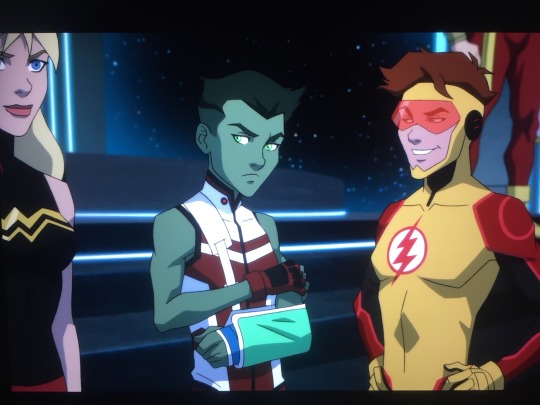
Jeff: Like the Outsiders, we must live in each other’s spotlight
Ok yes that is kinda a very Bart thing to do - his way of complimenting Gar for his achievements leading the outsiders - but it’s the fact that he doesn’t react in a regretful/apologetic way when Gar calls out in pain - he just stands there grinning at his clear injured friend and doesn’t bat an eyelid. (Also, does anyone else think Bart has a really evil/sadistic look to him in this shot - because I do and I can’t help but find it odd.)
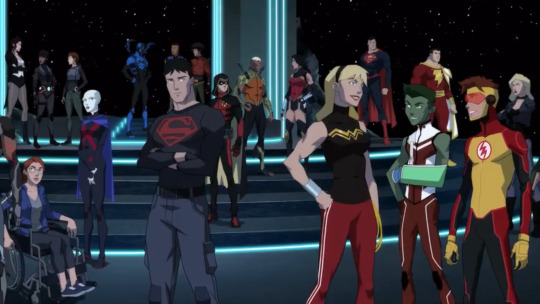
Another thing about this scene is that not only is Bart front and centre in the panning shot of heroes (which I’ll come back to in part 2) - but he is completely separated from the two people he is usually paired with onscreen - and that’s Ed and Jaime who are both placed together at the very back of the shot. Now when I say ‘usually paired with’ I mean ALWAYS - excluding ’Homefires’ (though that is the first ep to show Ed’s in S3 - so I say it still counts) Bart is either next to Ed or Jaime or both - l know because I checked.
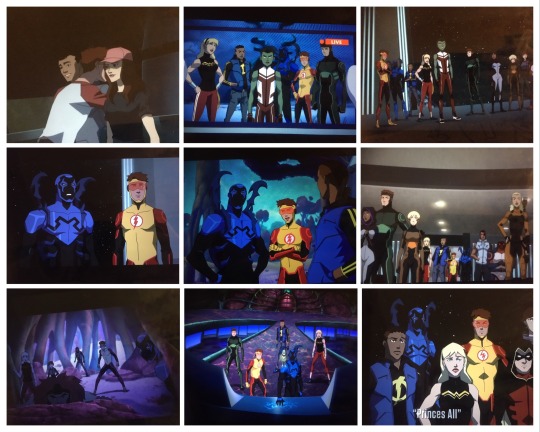
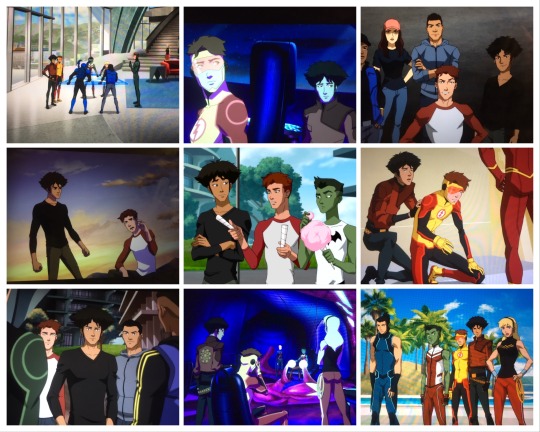
That is until they all come out of the pit - then something seems to change with the trio, for Bart appears to constantly isolate himself from the other two...
Now you probably think I sound mad, that I’m just reading too much into it the layout (as usual) but it’s there - it’s subtle - but it’s definitely there. Like I’ve highlighted with the season as a whole Bart is usually stood with E/J - it highlights his connection to them and establishes their specific friendship in comparison to the rest of the characters. Composition is important - especially in seating arrangements.

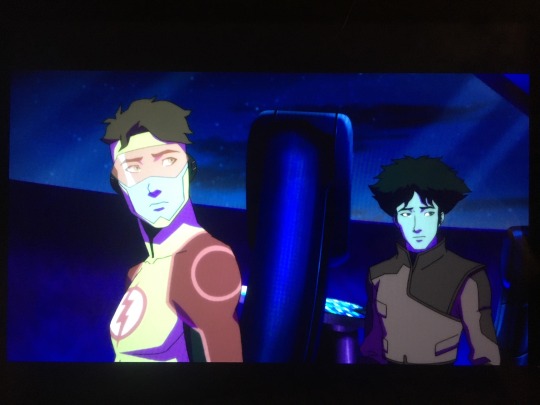
At the beginning of ‘Into the Breach’ Bart takes the front most central seat which draws attention to him - being the speedster he is he is always running headfirst into any situation with confidence - so he is at the very front of the ship and closest to the action. Then he has Ed sat in the seat next to him - this allows for them to share a two shot and again reinforce their connection - which they definitely have (see my post about Ed’s powers - there’s a few). This quick shot tells a lot - the angle even gives the impression that Bart is closer to Ed than Vic, which increases their divide - he doesn’t know Vic or maybe trust him yet, unlike he does with Ed. While Vic seems closer to Blue because we know they’ve previously made a connection offscreen - “Bluebeetle taught me that one”.
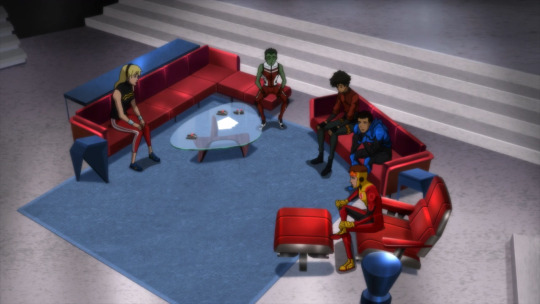
Yet fast forward to the scene at the premiere building post x-pit and thinking they’ve lost big time - when you look close there is a definite dynamic change between the trio. Though they are still grouped together, they are actually divided - the chairs divide them - whilst Ed and Jaime share the same sofa, Bart is on his own and thereby isolating himself from his friends. But not only that, look at the way he’s sat compared to everyone else - he is the only one with crossed legs. Whilst the others all mimic the same body language - hunched over, hands on knees, legs apart - they are all united in their defeat - but Bart is alone.
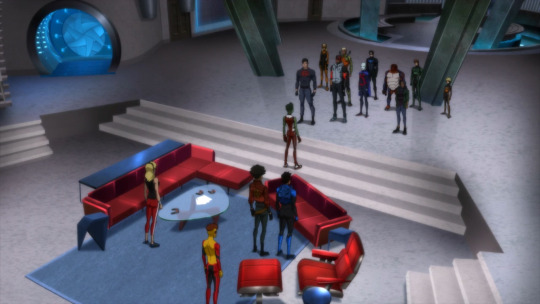
Noticeable again after Vic and the others return, Bart is on his own, the furthest away from the group - he is now the one hiding at the back - which is a big change from the shot on the bioship. Something has changed for him - he can’t connect with the two people we know he cares for.
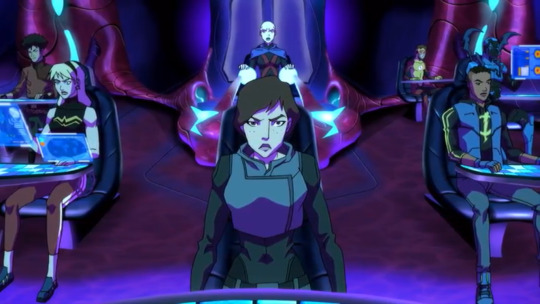
It continues into ‘Nevermore’, this time on the bioship the trio are to the back - the dynamic they last had on the ship has altered massively. Ed now sits on his own side completely separated from Bart and Jaime - this may account for his own feelings of guilt (see my Outsiders in turmoil posts) - he feels he needs to distance himself because of his own failures. Yet he is still in line with Jaime - like in the all the previous shots post pit, he remains on equal ground with Jaime. But for Bart, he is disconnected and hiding at the very back - he has lost the confidence to be front and centre on missions and with his friends - but why?
They all experienced the pit, yet Bart seems the most affected (in a subtle sort of way) - from confident and eager, he’s now isolated and hidden away. And yes, these are very subtle moments that you don’t notice - but because this is animation that makes the subtlety more important - because these are conscious decision being made and agreed upon - they are not random acting choices like in live action.
Now my final notice for this part 1 post - because this has become very long - is the scene just after Vic disappears to follow Granny - I’ve only just noticed this whilst gathering pics for this post and it’s actually blown my mind.
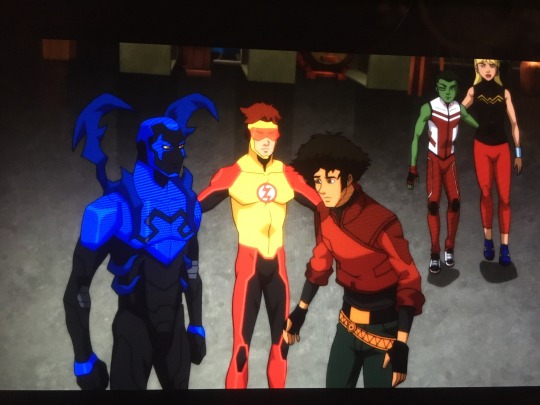
So I’ve always found this moment strange because to me it feels like Bart is almost blaming Ed for everything - and when you look at the shot it does look like everyones giving him evils. I don’t think that is what’s happening but I can imagine that’s what Ed thinks is happening. However what I realised this time round is that that is the real Bart we hear - not the one we’ve followed in S2&3 - but the cynical one of the future. For 10 seconds Bart finally breaks character and drops the mask to reveal his true self - the realist of the apocalypse. Maybe this is why he’s distancing himself - he didn’t come to the past to have fun and joke around - he was a kid with a job to do - and just because he’s done it doesn’t mean he should lose focus. Maybe the pit reawakened the ghosts of his past - the lives lost because of the apocalypse - the lives that could still be lost if that future still happens because he was too distracted to notice the signs.
Barts psyche has always been what fascinates me about his character - because the happy goofball we see isn’t even the real Bart - thats Wally and Barry he’s imitating - Bart has spent 3 or so years living in the guise of what he wants people to see - what he thinks they expect to see in the grandson of Barry Allen - which is mad. This is why I want more Bart - I wanna see what isn’t being shown to us - and I think the x-pit might just have unlocked that possibility. 🤞
- To be continued in Part 2 -
Other Posts:
- Ed’s Powers - ‘Into the Pit’
- Outsiders in Turmoil 1-6 can be found under the tag outsidersinturmoil
#bartwatch#young justice#yj outsiders#yj3#young justice outsiders#yj#yj season 3#bart allen#eduardo dorado jr#el dorado#kid flash#yj theory#reflection#jaime reyes#blue beetle#connections#isolation#analysis#beast boy#garfield logan#screenshot#shot analysis#impulse#yj season 2#yj2#young justice invasion#bartuardo#bluepulse#into the breach#nevermore
198 notes
·
View notes
Text

@findingniamho
HAHAHAHA thank you so much for this ask!!! ❤️ This is exciting. Honestly the Egghead fight was one of the most entertaining scenes to write. (Coming up with all the puns was an egg-celent time.) Rereading it just now was like an out of body experience 😂
Link to the original chapter here - passage & commentary below the cut!
So I have to start with how this scene was born. This is a Simon scene. He’s had a couple fight scenes with Vampire, but I wanted to show him off as the superhero of the city. What was he doing before Vampire appeared on the scene? What are his strengths and weaknesses? Despite the scene’s silliness, it’s also one of the first where we start to get a sense of what Mayor Mage is up to.
So I knew I wanted him to do the typical defending-the-city thing, and showcase him and Penny as the dread companions power duo.
Besides the plot stuff, my main goal was to make this scene as ridiculously, stereotypically comic book-ish as possible. 😂Hence, Egghead the Villain.
Most of the credit for Egghead goes to my friend -- they’re really into DC and helped me with a lot of the plot stuff in this fic and making things semi-realistic. (Every time you read a clever plot point, it was probably them. 😂) For this non-Vampire fight, my friend suggested a gangster who was doing crimes and bribing the police. Hence this exchange--
“Okay, okay, um-- fuck. Did you call the police?” She huffs. “Yes, and I think they’ve been fucking bribed, because they pretended they didn’t even know who Egghead was! Can you believe that?”
I made him a repeat villain because honestly, I just thought it was more compelling that way. They know who he is already, Simon can grumble about him, they have egg-themed quips at the ready, etc. 😂
As for the name, Egghead. I love how it came together because Simon is a baker, and I was able to work a couple baking jokes in there eventually. But in reality, it was me begging my superhero expert friend (named t below) to help me out with crafting this villain and coming up with some witty exchanges. A transcript of our conversation with the brainstorming and some of the rejects--
t: the gangster has a nickname right? he has to if he’s a supervillain t: make it a gimmick t: like if he has a red outfit call him mr. red or something t: he has a flamethrower and call him dragon (this made it in, later) me: Vampire already has a flamethrower t: they can be forced to fight him together me: Vampire is at home studying bc he’s a NERD t: ok he can be bald and simon can call him egghead me: THANKS I HATE IT t: simon throws him on the ground at the end of the fight - that was over-easy me: I hate you where do you get this shit t: I mean it’s typical superhero stuff t: he wears yellow and white and deals crack me: This fic is so food themed I love it t: that’s your villain. that’s it. t: listen, if the Flash can have an ice skating villain, YOU CAN HAVE EGGHEAD. And he was born.
(And yes, The Flash does have an ice skating villain. AND SHE DOESN’T EVEN HAVE ICE POWERS.)
Okay, let’s do this! Warning that this is definitely going to go through more than 500 words of the chapter. 😂
Men dressed in black suits with bright yellow pocket squares. And larger men around the perimeter, wearing grey and holding flashlights. It looks more like a business transaction than anything; there are briefcases and money being passed back and forth, hands being shaken. “Hey!” I call. There are six men, and they all turn to stare at me, and then make a run for it. The flashlight beams dart wildly and I hear a few of them clatter to the floor. Everyone starts yelling at once and looking for an escape.
I basically watched an episode of Brooklyn-99 and crafted the warehouse drug deal based on that.
“Don’t move. There’s only one exit,” Penny says in my ear. “And you’re standing in front of it.” I stand my ground, but no one comes near me. The suited guys stay slightly behind the muscular ones. Finally, one of them steps forward. “Mage’s Head Boy. Come to tell us off?”
This scene was also an opportunity to have Penny in Simon’s ear! I wanted them to work together more closely than just talking about superhero stuff - I wanted Penny to be invaluable to Simon’s superhero success and in on the action, too. She’s kind of modeled after Oracle from Batman throughout this fic.
Mage’s Head Boy is a pretty transparent CO reference.
There are times when I’m grateful for my ability to just have muscles and growl at people and make them disappear, and there are times when I wish I was witty like Vampire. This is definitely the second. I can’t think of a response to that. Luckily, I have a best friend with a head full of wit. “Tell them to fuck off,” Penny says. Then again, maybe not. What would Vampire say? I get hot and frustrated in the face of danger. He seems to get cooler the higher the stakes get. I fall into a fighting stance. “You wish.” The guy takes a step backwards. “But since I can’t bring you to the police, I suppose I’ll just have to teach you a lesson.” “That was good,” Penny says in my ear.
I obviously had to work a bit of Baz jealousy / crushing into this. I like the idea of Penny being super blunt. She’s smart and sometimes witty, but more often she just says it like it is. “Cooler the higher the stakes get” was a direct reference to the similar line in Carry On. With Simon’s last line - this scene was all about showcasing him as a “typical” superhero that you’d find in a comic, fighting a classic comic book villain. So I gave him one of those cheesy lines.
I’m surrounded. There must be fifteen or twenty of them. Eight huge muscular guys, and the rest in suits. They form a loose circle around me. Almost all of them wield knives, but I don’t see any guns so far.
I knew from the outset I wanted this to be a one-against-many fight. At this point in the story I’d set up a good dynamic for Blade vs Vampire, but not so much Blade vs. other city threats. What makes him a trustworthy hero? Simon’s origin story is that he got news attention by fighting off a group - so putting him in this group fight setting was a chance for him to shine.
A man steps out from the shadows. He’s bald, with a straight, dark mustache, and he’s wearing a pristine white suit and a shirt the colour of an egg yolk. “Egghead,” I say in what I hope is a threatening tone. The name sounds absurd. I’m glad the mask covers my mouth, because I don’t think I can keep a straight face. Penny coughs. Benedict Eggerton, better known as Egghead, is a drug lord who wears yellow and deals… crack. (I know.) (He got into crime early; his parents were poachers.) (Okay, I made that one up. I can’t help it.) I put him in jail earlier this year, but he escaped and fled north.
I was laughing so hard while writing this. You can see in the text exchange above where the suit and nickname came from. I was trying to come up with what his first name might be (my first idea was Sunny). I was so amused when I finally thought of Benedict. 😂 The poachers line is also from my friend T, and the “north” is a reference to Scotland, which comes back later as the Scotch Egg joke.
I draw my weapon, trying to look as menacing as possible. “I remember your blade being bigger,” he says, eyeing my kitchen knife. “Is it too cold for you in here?”
PFFFFFT I LOVE THIS JOKE okay so. I originally made Simon forget his sword because I thought the fight would be too easy - and going back to what I said above, he’s kind of returning to his “roots” with this fight - that spark he has that makes him a hero. And then I wrote the line “I remember your blade being bigger.” TO BE CLEAR, this was not originally intended as an innuendo.
And then my friend said something like ‘he should turn up the heating in this warehouse then’, and I was like OH DING DING DING PENIS JOKE! 😂I’m oblivious sometimes. I’m glad I realized in time because this is honestly one of my favorite villain lines I’ve ever written.
I really, really wanted to give the “too cold” line to Vampire. It would be perfect for him. But Simon always has his normal sword with Vamp, so Egghead it was. And he instantly became an icon. 😂
I twirl the knife between my fingers. “I can crack you anyway.” “Good effort,” Penny whispers. “But a bit rough on the delivery. 'Take a crack at you' might have been better...” “Sword or no sword,” I continue, “you’ll be an egg wash by the end of this.” “What?” Penny says. “Is that a baking reference?” Egghead cracks his knuckles, and his men rush me.
Much like Penny does later in the scene, I had a tab open of egg-related words up while writing this. I had to work in the baking reference. But a terrible one. There’s a French term for whisking eggs that basically translates to “beating eggs into snow” - and I wish it was a thing in English, because, you know, Simon Snow. Oh well. 😂
I Google a list of ways to make eggs. Simon needs to win this fight, but more importantly, he needs to get some egg-themed one-liners in there to show them who’s boss. Chances like this don’t come around very often.
Listen, Penny is very dedicated. I love the idea of heroes just being quick-witted and coming up with these ridiculous quips on demand. But ultimately, I thought it was funnier - and more in character for Penny - to do this. (Even though her Superhero name is Quickwit, oops.) She has the world of Google at her disposal. Egg puns may not seem important, but superhero image and reputation is half the battle.
Simon is being attacked from all angles, but he fights like a whirlwind. The bulky guys attack first, mostly with their fists. Simon kicks their legs out from under them. He throws them across the floor like they weigh nothing. “Behind you!” I say. Simon spins around and disarms the man behind him, twisting his arm, and I hear a shout through my earbuds. He grabs the guy’s knife and kicks him in the stomach, sending him sprawling. Simon Snow faces fifteen men with nothing but two knives, looking like he’s ready to explode.
I loved writing this from Penny’s POV. I am used to writing fight scenes from the POV of the person fighting, so this was definitely a cool challenge. It’s part of why I brought Penny into the scene in the first place - so I could show Simon in third person. Almost like we’re watching a movie and getting some overhead shots. From his POV, you don’t realize quite how awesome he is. So getting to showcase him like this was really fun.
I still have to wonder how Shepard knew… well, everything.
Don’t tell anyone but I didn’t know yet either
“He’s Scottish,” I tell Simon. “Scotch Egg.”
I know. This one’s bad.
He’s a blur of gold and white in motion. He throws his knife—I have no idea where he learned to do that—and it embeds itself in one of the men’s legs. He rolls across the floor, picking up two more discarded knives.
I don’t do a ton of plotting/outlining with fight scenes, but one thing I decide in advance is where and how everyone gets hurt. I didn’t want Simon to win the fight too easily, but I did need to injure him somehow. So it wouldn’t be too easy, but also to serve as a counterpoint to the socks thing later.
I watched a lot of action sequences to write this fic, especially with the trickier one vs. many scenes.
Simon tosses him like a sack of flour.
Couldn’t resist the baker!Simon reference.
“Hard or soft boiled,” I whisper. “Which way is it gonna be, Egghead? Hard or soft boiled?” Simon shouts. He whispers to me, “That was stupid.” Egghead raises an eyebrow. “Last chance to leave us alone, Blade.” I consult my list of egg dishes. “Give up before you get scrambled.” Simon twirls his blades. I love it when he does that; he looks like Deadpool. “It’s your last chance to surrender before you get scrambled.”
I loved the hard or soft boiled line at first. And then I wrote it down and said it out loud, just to check, and it sounded SO DUMB. 😂I almost took it out, but then figured—Simon is probably not going to think this through, either.
Maybe the Deadpool line was a bit on the nose here, but I wanted to give readers some really vivid imagery of what Simon looks like right now with these dual wicked blades kitchen knives.
“I prefer my eggs… poached,” he says.
Even though Egghead has turned out to be quite a serious villain—there are guns, drugs, and a backstory—he is, after all, original master of the egg puns. He would never turn down this opportunity.
Egghead scrambles (ha) to his feet
I think Penny is just me in this.
“Over-easy,” I whisper.
“That was over-easy,” he says.
Not my best. But it had to be in there.
I’ll skip the serious bits, since the plot there is pretty self-explanatory, to this:
I wish he’d asked what we serve, because I have so many egg puns at the ready. Eggs-ecution. Hash-ing out justice. Karma served hard.
My beta ashspren gave me this line, and I could not be more grateful. Imagine the chapter without this. It would be a shame.
Here are a few egg puns that didn’t make the cut, SADLY:
You're washed out, egghead
*Egghead gets angry* hey, it was just a yolk
I had to go "beat" some eggs
*uppercut* Sunny side UP!
I'll bash in your Eggnoggin’
Some people are just bad eggs
Sorry this is so long—this has been a purely self-indulgent experience. Thanks so much for this ask, I really enjoyed writing this and I hope you like it! ❤️
#ask#fanfic asks#ask game#dvd commentary#holding out for a hero#heroverse#hero fic#superhero snowbaz#the golden blade#hfh#behind the scenes#bts#writing things#hfh behind the scenes
15 notes
·
View notes
Text
LGBTQ Manga Review - Yuri Life

The twenty-first century brought significant change and innovation to the genre of yuri. The first yuri magazines were published and included stories that left confines of the schoolroom, allowing creators to explore actual queer women living in a realistic world. Such works include the legendary Rakuen no Jouken, which will finally be adapted into English next year. Because of the internet and sites like Pixiv and Twitter, many of these works found an audience and success. Kurukuruhime’s Yuri Life is absolutely a product of its time, in the best possible way. The single volume is a collection of short comics the author originally uploaded to Pixiv and social media. It depicts (mostly) adult queer women in real and meaningful relationships with each other. It is absolutely a triumph and a joy to read.
Yuri Life features ten different couples across ten chapters or “rooms.” Each of these couples live together, and the series follows them throughout their everyday lives; It is pure yuri cohabitation!! These chapters contain multiple short stories, some even as brief as a single page, which is to be expected considering that they initially posted online. However, when tales are so short, they have to be highly focused and polished, and Yuri Life nails this. Some of the narratives are just adorable interactions of someone cooking for their partner or telling them, “I love you.” These stories are simple but so enjoyable and fun to read. It is like looking into a brief window into these women’s lives together and seeing them at their best moments. Whether funny, heartfelt, or both, they will bring a smile to the readers face.

Occasionally, chapters or parts of chapters in Yuri Life will have more meaningful content and conflicts. Examples include a woman getting jealous because of the attention her partner’s job gets her, or another becoming annoyed that her girlfriend frequently travels for work. However, with the expectation of a supernatural story involving a grim-reaper, these stories stay grounded, never relying on melodrama or impossibly high stakes. This component is the crux of Yuri Life’s brilliance; it is about women existing together in believable, realistic, and sustainable ways. Being privileged to observe these women in love and life is a heartwarming experience.
The characters in Yuri Life are well developed and likable. Short works often suffer because they cannot devote time to establishing characters and relationships, but Yuri Life escapes this fate. It accomplishes this feat by beginning each chapter with a one-page character introduction that describes both women and their relationship. Each couple feels perfectly paired, such as the nervous and timid Tanabe and her vixen girlfriend Nanatsuno or the cool-headed Okazaki and her boisterous affectionate girlfriend, Oshikiri.

The women in Yuri Life are rarely seen apart from each other. Because of these factors, there is no need to develop each as an individual beyond their dominant personality traits. The characters do not exist outside of a relationship, and all interactions are masterfully written to be almost exclusively between the two partners, enhancing and reinforcing their relationship. There is a considerable downside to such a structure. Because only single major personality traits define the characters, if one person or a dynamic is unlikable to a reader, there is little given to redeem them. For me, this was the case in chapter five, which featured a teacher in a relationship with an underage student, and six, which includes a yandere character.
Unlike most manga, Yuri Life’s illustrations are in full color. Kurukuruhime makes excellent use of this element in her backgrounds, which are often patterns or single blocks of color. Color is also brilliantly employed in the character designs, letting each girl have a unique and clothing color. However, even without color, the character designs would still be distinct and unique. Each woman has a different fashion sense, unique proportions, and individual facial expressions.
The drawings themselves are loose and flowing, similar to sketches. This style nicely complements the cheerful and lighthearted tone of the story. In other works, such drawings may be overly abstract or undefined. However, the color nicely balances out the art style, making Yuri Life one of the most visually distinct manga I have had the pleasure of reading recently.

The yuri elements of the manga are strong and fantastic. Each couple feels different, with both the characters and the relationships coming at various life stages and incorporating different dynamics. However, throughout each chapter, a few details are constant, love and affection. Each person is in love with the other and displays their passion frequently there own way. Some shout it to the heavens while others send barrages of text messages to their lovers. Many of the couples are also visibly physically affectionate. The manga frequently mentioned sex and shows instances of sexual contact, including displaying character lying together after being intimate. However, these scenes are usually pretty minimal in their exposure and tasteful. Most service to be found or excitement to be had is in witnessing these beautiful, loving people be affectionate for each other.

Yuri Life is a phenomenal work. Seeing great examples of women living together and loving each other is as important as it is enjoyable. Even without a plot, the work is riveting thanks to fun scenarios and adorable couples. The manga is a profoundly heartwarming and joyous depiction of yuri cohabitation. Yuri Life is simply a masterpiece and an absolute must-read.
You can get Yuri Life digitally and in print today: Yuri Life -https://amzn.to/2NthbKC
Ratings: Story (Scenarios) – 9 Characters – 7 Art – 7 LGBTQ – 10 Lewd – 3 Final – 9
Review copy provided by @yenpress
#yuri#lgbt#lgbtq#lgbtq+#yuri life#wlw#gay#manga#reviews#queer#comic#comics#girls love#gl#art#lesbian#lesbians
534 notes
·
View notes
Photo
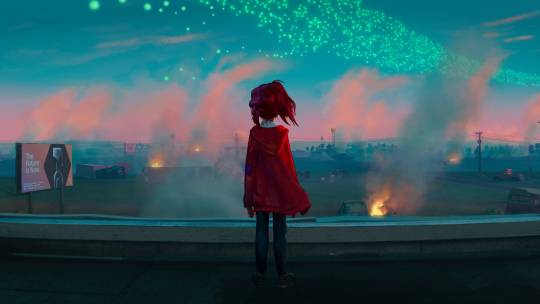
Drawing Closer.
Animation lovers: watchlists at the ready. From action capers to Irish folk tales, in 3DCG or the humble pencil, by manga legends and raucous newcomers, Letterboxd’s animation correspondent Kambole Campbell picks ten new feature films we’re excited to see.
When the gears of the live-action film industry ground to a near-halt earlier this year, animators were still at work. As a medium that, at its most fundamental level, is controlled fully by the imaginations of its creators, this might be the one element of the screen industry that has some kind of ability to operate throughout the pandemic.
Based on previews from this year’s online edition of the annual Annecy International Animation Film Festival, there’s a lot to look forward to that’s still in the works, even now. With everything from blockbuster capers and fantastical alternate histories, explorations of folklore and real human stories alike, we can expect a spoil of boundless and endlessly creative films limited only by the imaginations of those drawing them.
Here are ten animated features I’m specifically excited for, in no particular order (except for the first—fight me if you like, Masaaki Yuasa will always win).
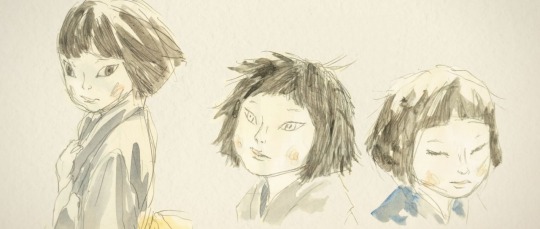
Inu-Oh Directed by Masaaki Yuasa / Due to release in 2021
If there’s one new animated film to watch in the next year, make it Inu-Oh (but also, don’t limit yourself to one). Masaaki Yuasa has proven himself time and again to be one of the most exciting and versatile animation directors alive, as well as potentially the busiest. With his studio, Science Saru, this year alone he directed two television series—the fantastic ode to animators, Keep Your Hands off Eizouken!!, and the intense Netflix disaster series Japan Sinks: 2020—as well as the melancholy, romantic feature film Ride Your Wave.
Inu-Oh looks to be just as imaginative and wild as anything else Yuasa-san has made, based on the work-in-progress glimpse at Annecy. Set in fourteenth-century Japan, the film is based on Hideo Furukama’s novel about the legendary masked Noh theater performer Inu-Oh, born with “unique characteristics”, which lead them to cover their entire body. Both novel and film focus on their close friendship with the blind biwa hōshi (lute priest) Tomona, and the success they find together.
“We often think of history as moving in one straight line, but it actually branches off, and people and events in those branches have been forgotten or disappeared,” Yuasa-san said during the Annecy preview. Inu-Oh explores those hidden branches through an anachronistic reimagining of the roots of traditional Japanese entertainment. The main idea: what if the performers of Noh theater were treated like Japan’s pop idols of today? Yuasa-san described the main characters as “kind of like The Beatles” of 1300s Japan.
On credits alone there’s a lot of promise, with the legendary Taiyō Matsumoto— the mangaka who created Tekkonkinkreet and Ping Pong (and collaborated with Yuasa-san on the latter’s fantastic anime adaptation)—lending his eccentric yet elegant designs to the film. The preview opened with minute movements comprised of rough, wide almost painterly brushstrokes, an art style almost completely unlike anything Yuasa-san has done previously.
As it turns out, this is but one way of representing the world of Inu-Oh, through the perspective of Tomona, a Notes on Blindness-esque way of representing how Tomona perceives things. From those small glimpses, Inu-Oh looks to be a beautiful, anthropological piece built with both the same free-form style that characterizes the rest of his work, and perhaps something more classical as well.
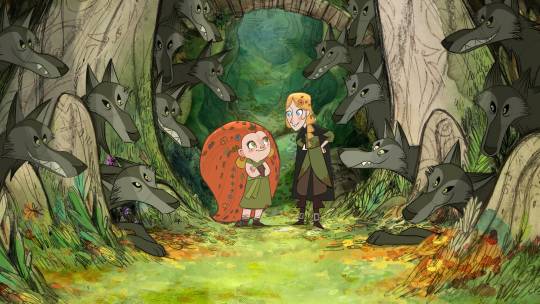
Wolfwalkers Directed by Tomm Moore and Ross Stewart / Coming to theaters and Apple TV+ in late 2020 after a September 12 premiere at TIFF
Made and set in Kilkenny, home to the acclaimed animation studio Cartoon Saloon, the much-anticipated Wolfwalkers is inspired by animation’s past, Celtic legend, and the local area’s history. Set in 1650, Wolfwalkers takes place amidst attempts by the English (Cromwell, specifically) to pacify and tame Ireland. Representative of those wild elements the English are seeking to eradicate are the ‘wolfwalkers’—people blessed by Saint Patrick with the power to leave their bodies at night and become wolves during their sleep (Irish werewolves, essentially). The story follows an English girl, Robyn Goodfellowe (Honor Kneafsey), who moves to Ireland with her father Bill (Sean Bean), to help carry out Cromwell’s plan to kill the wolves.
Like his previous film, Song of the Sea (2014), co-director Tomm Moore says this new film is based upon a childhood story common amongst those living in Kilkenny. And like his previous films (including 2009’s The Secret of Kells), it looks to be a visual feast, with a mixture of dynamic camera styles, pre-viz work and hand-drawn animation for moments like its ‘wolf-vision’. Moore draws the ideological divide between the English and the Irish into every scratch of pencil, the occupied cities comprised of rigid lines and angular designs, while the forest and its inhabitants are more free-flowing and unkempt.
Moore cited the rough charcoal lines of Isao Takahata’s The Tale of the Princess Kaguya as one influence on the Cartoon Saloon animators’ approach; the way that Robin is drawn gradually changing along with her worldview. Cartoon Saloon is yet to make a bad film, and Wolfwalkers looks like it might be the company’s most beautiful myth yet.
Stay tuned to The Letterboxd Show for an interview with Tomm Moore.
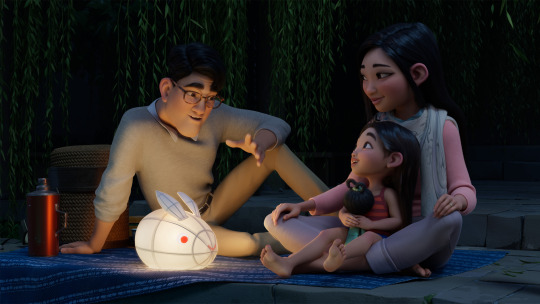
Over The Moon Directed by Glen Keane / Due on Netflix, late 2020
The feature directorial debut of animation legend Glen Keane, early glimpses of Over The Moon look utterly bonkers. A long-time character animator for Disney, having worked on almost all of the studio’s animation output since Pete’s Dragon in 1977, Keane looks to be bringing his vast array of talents to his first feature film. The trailer alone shows off a vast blend of styles, from the 3DCG (three-dimensional computer graphics) and more realistic lighting that we’ve come to expect from Disney animation, as well as the more textured, hand-drawn work the director cut his teeth on.
The story itself sounds wild, though it starts out simple enough: Fei Fei (Cathy Ang) is enraptured by her parents’ stories of a goddess living on the moon. After her mother passes away, Fei Fei begins to believe the story is true, and decides to build a rocket to get there. There’s also a hint of something living there. Whatever the answer is, I’m curious to see it, and with a star-studded cast that includes the likes of John Cho and Sandra Oh, how could I turn it down?
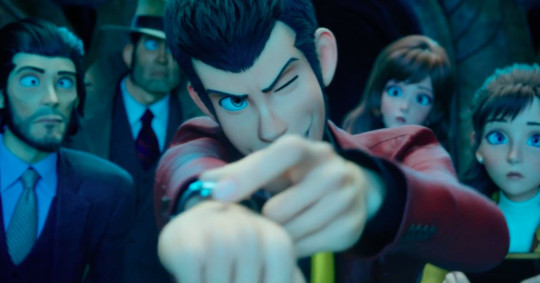
Lupin III: The First Directed by Takashi Yamazaki / Released in select territories; wider release due late 2020
Takashi Yamazaki’s Lupin III: The First, the first 3DCG-animated Lupin III feature film, looks rather incredible. It’s the latest in a vast, 50-year history of anime based on the manga from the late Kazuhiko Katō (known by the pen name Monkey Punch). Despite that long history, the Lupin III franchise has always managed to resist being made obsolete; part of its ongoing appeal is its ability to continuously adapt to new contexts and styles while retaining its simple charms, and The First is no different.
The film announces itself in the same way as ever, the iconic ‘Lupin III’ theme blaring over a flashy title sequence that builds off familiar iconography, as well as moments from the franchise’s history. It revels in the style of old-school caper the show continues to embrace, taking delight in the exploits of a modern-day gentleman thief who announces his robberies with calling cards.
Even with the new and unfamiliar animation style, Lupin III: The First feels like a classic Lupin III tale, taking the story back to the 1960s (the decade during which the character was created), and even putting its main character back in his classic red suit. Each character design translates surprisingly well to this mode of animation—Lupin’s gangly frame, as well as the unique appearances of his compatriots Goemon, Fujiko, Zenigata and Jigen (who looks bizarrely attractive in this—although, to be fair, “everyone in this movie is f—king sexy” according to Letterboxd member London. Accurate).
Yamazaki does well to avoid the often sterile feeling of 3DCG animation by having these characters all move like the cartoons they’re based on (for starters, a long-running visual gag of Lupin leaping straight out of his clothes). It might take some adjustment (which for me, only really lasted up to the opening credits) before it becomes fully dazzling. Lupin III: The First might be the most exciting action caper of 2020, in any medium.
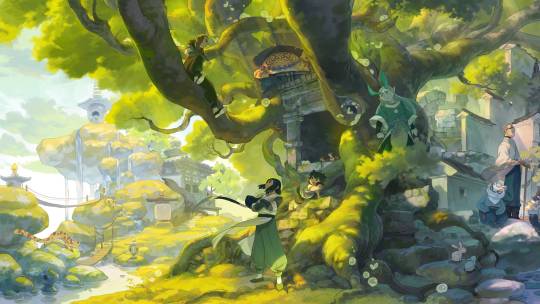
The Legend of Hei Directed by Mtjj / Released in China late 2019; international release TBA
Rivalling Lupin III: The First for most flamboyant animation on show at Annecy was The Legend of Hei, a feature-length prequel to the Flash web cartoon The Legend of Luo Xiaohei by Chinese artist Mtjj (real name Zhang Ping).
The series tells the story of the spirit Luo Xiaohei, who takes the appearance of a small black cat before being adopted by a young girl. The film’s story focuses more squarely on the cat, Xiaohei, who transforms into a man and goes on to live in the forest, his carefree existence soon interrupted by the discovery that humans are beginning to encroach on that territory as their cities expand, and technological progress puts the two worlds increasingly at odds.
As the film explores more of Xiaohei’s origins, the thick, clean line-work and cute art style disguises a much grander, epic conflict at play, realized in some wildly animated fight scenes. (“Starts off small and adorable, then expands into an epic conflict on an Akira scale,” writes Tasha Robinson.) The 2D-animated film allegedly took five years to produce, Mtjj saying in an interview that the complete film, at 100 minutes, required more than 70,000 drawings—or around twelve per second.
With its gentle score and clash of the spiritual world with the modern, the environmentally conscious work of Studio Ghibli comes to mind, as does the Nickelodeon series Avatar: The Last Airbender (perhaps the most popular consideration of East Asian spirituality in the West, especially with its resurgence of popularity thanks to Netflix). The Legend of Hei enjoyed an extremely lucrative run in China in late 2019 thanks to the original cartoon’s sizeable fanbase at home. No news yet on who will pick the film up in the West.
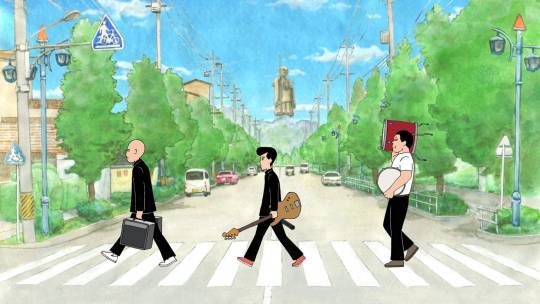
ON-GAKU: Our Sound Directed by Kenji Iwaisawa / Expected to release late 2020
Rotoscoped by hand over a period of seven years, the independently produced anime ON-GAKU: Our Sound has a rather appropriate match of creator and subject: a film about amateur musicians made by amateur animators.
Director Kenji Iwaisawa adapted the film from Hiroyuki Ohashi’s cult manga, and there’s a charm to the rudimentary style of its art, the plain faces of its characters resembling the designs of something like ONE’s Mob Psycho 100, while also matching that show’s deadpan, oddball sense of humor. The laid-back voice acting only adds to that effect, as main character Kenji and his cohort’s obvious excitement flattened into a consistently amusing monotone.
It’s not quite a classic tale of underdog artistry, as the group never really gets better, but the film embraces the primordial noise that emerges whenever they pick up an instrument. Iwaisawa takes the characters seriously, showing their raucous and unconventional performances with complete sincerity. “Loved the deadpan humor and appreciated the message about how art can act as an impetus for positive change in our lives,” writes Dan.
Passion, companionship and collaboration is what’s most important to Our Sound. It’s a deeply weird film, but one filled with great ambition and visual wonder, increasing in boldness as it goes. The different styles of coloring and expression that emerge beyond its initial palettes are radical enough to catch anyone off guard.
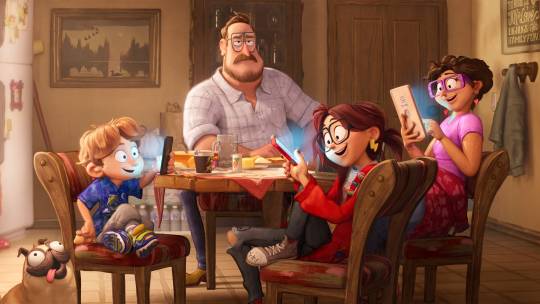
Connected Directed by Michael Rianda / Releasing in most territories in October 2020 (October 23 in the US)
Connected is the next step for Sony Animation as it moves in an exciting new direction (the studio recently stated that it would be green-lighting more animation aimed at adults). Produced by Phil Lord and Chris Miller, off the back of their immensely popular film Spider-Man: Into The Spider-Verse, Connected is imbued with the same kind of idiosyncrasy and innovation that made Spider-Verse a mega-hit.
From first-time feature director Michael Rianda, best known for his work on TV’s Gravity Falls, Connected is a family-road-trip-AI-apocalypse movie, based on the bizarre chemistry of Rianda’s own family. Formerly known as The Mitchells vs The Machines, the film looks at the push and pull between technology and human relationships, and how different generations respond to the ongoing changes in how we interact online and personally.
While this isn’t animated “on twos” (where each frame of character animation holds for two frames of background movement) as Spider-Verse often was, Connected also attempts to maintain a ‘drawn’ quality in its art. Characters move fluidly, but with clear outlines drawn from simple shapes. There’s also a strong contrast between the lived-in detail of human habitats versus the stark minimalism of the domain of the robots.
Thankfully the clips from the film don’t look nearly as finger-wavy and luddite as the trailers might suggest. (They appear to take the Boomer point of view that technology unequivocally ruins everything, but we know it’s more complicated than “screens bad”). In any case, it looks like the beginning of an interesting run for Sony Animation, and I’m keen to see how it turns out.
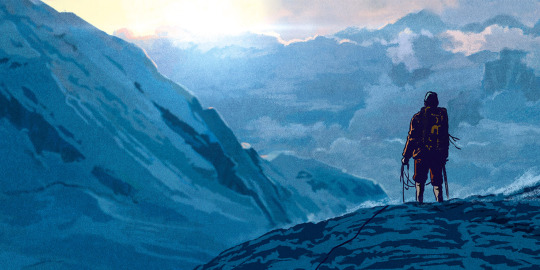
The Summit of the Gods (Le Sommet des Dieux) Directed by Patrick Imbert / Due to release 2021
Le Sommet des Dieux distinguishes itself in this list by being the one most firmly grounded in reality, but it’s by no means less wondrous. Based on Jirô Taniguchi’s five-volume manga Le Sommet des Dieux—itself based on the 1998 novel by Baku Yumemakura—the story starts with the question of whether George Mallory died going up or coming down the summit of Mount Everest on June 8, 1924. 70 years later, Fukamachi, a young Japanese reporter, stumbles across a camera potentially belonging to Mallory, and embarks on an adventure of his own with his friend Hasu Joji.
In close collaboration with the mangaka Taniguchi-san, who passed away during development, director Patrick Imbert seeks to replicate his art style, which was more aligned with that of European comics than traditional manga, with less exaggerated and highly detailed line-work. The team also looked outward from Taniguchi-san’s art, to the character designs of works such as Hiroyuki Okiura’s Jin-Roh: The Wolf Brigade, as well as his 2011 film A Letter To Momo, and the films of the late, great Satoshi Kon.
From what I saw at Annecy, there’s something of a mix between what Imbert calls the “documented detail” of Taniguchi-san’s work and simpler design for the larger urban spaces. To accomplish this, the studio draws its traditional 2D using modern techniques, such as “movie-style” framing—locations and interiors created in 3D software and then overpainted for detail, identity and authenticity.
The Summit of the Gods also seeks to recapture the detailed and subtle realism of Yumemakura-san’s depiction of George Mallory, with low-key voice performances conducted in shared sessions; recording movements and hiring a boom operator to make the sound more akin to live action, perhaps even more natural. Though production has already been long, the studio had thankfully pre-empted the long delays of Covid-19, so let’s hope we get to see the film with our own eyes, soon.
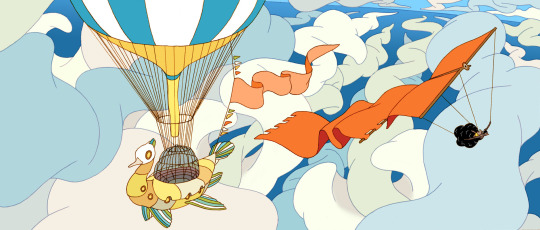
Sirocco and the Kingdom of the Winds Directed by Benoît Chieux / Scheduled for 2022
An original fable from animation director Benoît Chieux, Sirocco and the Kingdom of the Winds is still very much in the midst of production, with an expected release in 2022. It looks captivating; a surreal tale set in an imaginary kingdom with delicate and clearly defined artwork, about a being named Sirocco, a despised figure with the power to control the wind, who is forced into solitude by the denizens of this world.
The dream kingdom resembles a Spirited Away-esque land, with its own hierarchy and bizarre set of rules, mundanity mixed in with visual wonder. Flying crocodiles, living houses and strange humanoids populate it, and the main characters, a pair of girls named Carmen and Juliette, turn into cats themselves. All are drawn with wavy lines, soft colours and fluid movement, the surreal presented with an inviting rather than foreboding air.
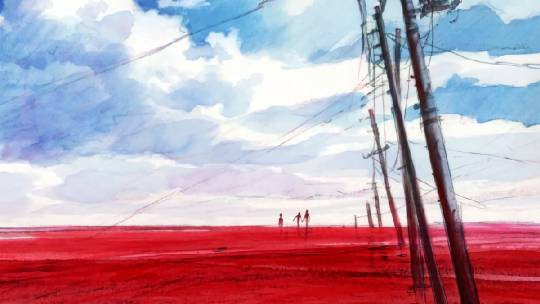
Evangelion 3.0 + 1.0 Directed by Hideaki Anno and others / 2020 release delayed; keep an eye on the official Twitter account for a new date
Hideaki Anno is set to bring his earth-shaking Neon Genesis Evangelion franchise to a close, again, with the fourth instalment of his ‘Rebuild’ series of films, Evangelion 3.0 + 1.0. Delayed for almost a decade now (the previous instalment came out in 2012!), and delayed again by Covid-19, the film looks to close out a grand rewriting of the original series that shot Anno-san and former studio Gainax to fame—“Bye Bye, All of Evangelion” the tagline reads. But we’re gonna have to wait a while longer to bid this final farewell.
Made with co-director Kazuya Tsurumaki (who has served as director with Anno-san since the original series), the first ‘Rebuild’ film, Evangelion: 1.0 You Are (Not) Alone, seemed to be a fairly conventional remake, updating the visuals and score with more modern techniques. The story starts the same: the isolated, depressed and self-loathing teenager Shinji Ikari is forced by his absentee father to help fight the mysterious, giant, alien ‘Angels’ by getting in an equally mysterious big robot called an Evangelion (“Eva” for short). He finds no self-fulfilment in this, and if anything, the close contact with other people only seems to push him further into himself. So far, so familiar.
However, the second film, Evangelion: 2.0 You Can (Not) Advance, veered completely off the rails in the best way possible, destroying audience preconceptions. The line between sequel and remake was fascinatingly blurred, and only continued to get weirder with Evangelion: 3.0 You Can (Not) Redo, as the story landed in completely unfamiliar territory, altering its characters beyond recognition while adding entirely new characters in the process. It’s now almost impossible to predict what 3.0 + 1.0 will be. The only footage available so far was a wild ten-minute clip in which the Eiffel Tower is wielded as a weapon by an Eva. We were this close.
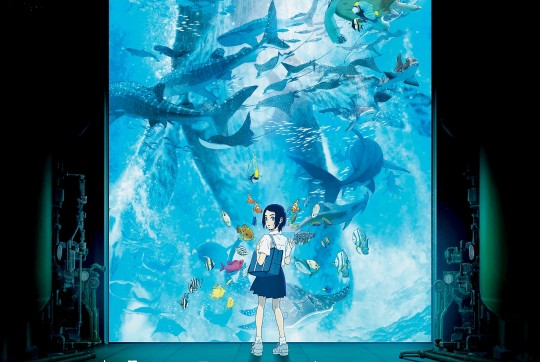
Ayumu Watanabe’s ‘Children of the Sea’ (2019).
There are almost too many gifts, even just from Annecy alone, to describe at length. A couple more worth mentioning: Anja Daiman’s musical comedy The Island looks fascinating for its reclamation of the colonialist story of Robinson Crusoe; and Yuta Murano’s first anime feature Our Seven-Day War promises plenty of plot twists amidst the actions of rebellious youth. A range of beguiling short films were also on display—a selection helpfully compiled here by Letterboxd member Iknow.
Outside of Annecy, other films are finally arriving, virtually or otherwise—such as Gints Zilbalodis’s peculiar and quiet Away, and Ayumu Watanabe’s beautiful and surreal Children of the Sea (with music from none other than Joe Hisaishi!). Though not all animation is comfort food by default—it is simply a medium, after all—it’s reassuring knowing that animated films are able to continue, in some form, through the pandemic.
Related content
Maxine the Movie Person’s excellent animation list
The 100 Highest Rated Animated Films of the 2010s according to our members
Revchu’s lists of the Top 100 Japanese Animated Films on Letterboxd, and the Top 100 Best-Rated Japanese Animated Films from the Anime News Network
Kambole’s selections in a Letterboxd list
Follow Kambole on Letterboxd
#Kambole Campbell#animation#anime#manga#inu-oh#lupin iii#lupin the 3rd#lupin the third#japanese cinema#cartoon saloon#wolfwalkers#tomm moore#ross stewart#letterboxd
7 notes
·
View notes
Text
MUSTAT LESKET FINAL MUSINGS
Okay, so I finished the second (and last) season of Mustat Lesket (Black Widows) a little while ago. It ends on a significant cliffhanger, and with a number of loose ends, but the series was never renewed despite the success of its first. Excuse me while I rant into the void, because there is zero fandom here for me to bounce things off (it’s an old show, 2014/16 AND not in English, so...) and I have so many thoughts...
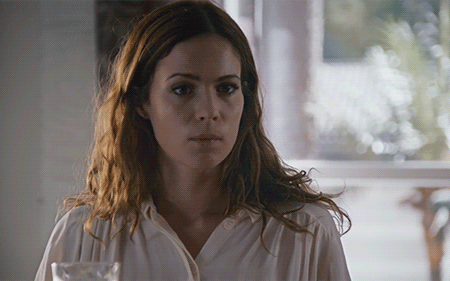
Firstly, I actually really enjoyed the first season of Mustat Lesket, and would recommend it based on that (and because I think Pihla Viitala is wonderful). It had just the right balance of mystery/thrills and drama, but also black/dry humour (I laughed a lot in S1). A lot of it was far-fetched and beyond belief, but you could kind of let that slide because the show never took itself too seriously. As far as character introductions went, I loved Veera and Johanna, and could understand the trajectories that had led them to feel like killing their husbands was a viable way out. Kirsi, well, she just felt like a necessary caricature, designed to milk the drama for everything it was worth. The dynamic between sweet, gentle Veera, emotional, crazy Kirsi, and strong, wilful Johanna somehow worked in S1.
And when Jukka returned, his redemption arc in S1 was done fantastically. Suddenly, you could understand (although not necessarily condone - same as with the widows and the boat) why he’d been such an asshole, and you could also see Veera start to come to that realisation too. The build up to their reconciliation at the end of S1 was the most authentic and believable in the entirety of the series (with the possible exception of Johanna and Petri, though they didn’t have the romantic chemistry that Veera and Jukka had).
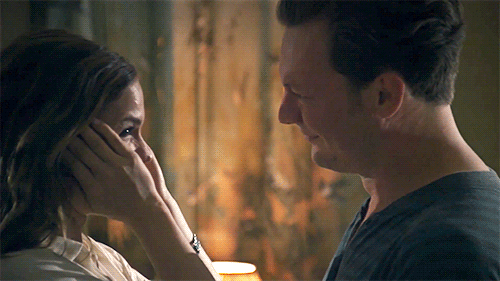
S2 however, was an odd and fragmented ride. With the truth of the boat blast that bonded them no longer a looming threat, suddenly the widows were thrown into very separate storylines. Kirsi, despite Veera and Johanna inexplicably taking her back into the fold after her betrayal, spends half the season away from them locked in a genuinely abusive marriage to a man she’s known for about half a minute. She pushes so far past the point of what is forgivable in terms of her friendships with Veera and Johanna, and becomes increasingly difficult to sympathise with. The bulk of Veera’s storyline is focussed on her weird open relationship with a high-profile MP/author who she has absolutely no chemistry with (I used to think Pihla would have chemistry with a rock - she’s had it with basically everyone else I’ve ever seen her paired with - but I don’t see it at all with this guy) while her own husband becomes a mere inconvenience, and Johanna...well I can’t even remember what Johanna was doing half the time, besides the will-they-won’t-they dance with Petri. The widows then intersect at the tiniest dribs and drabs to talk about the DVD. That’s really it.

And Jukka, oh my god, did they write him into the ground or what? S1′s redemption arc shows him falling back in love with his wife, so much that he’s willing to leave her to make her happy, and then to go to jail to keep her and their daughter safe. And S2 opens with him trying to drown her, not even stopping to question the legitimacy of what Kirsi - who has just been coming on to him behind Veera’s back - is saying? He then spends half the season locked in a basement, and when he does finally get free and worms his way back into Veera and Siiri’s lives, there isn’t a single proper conversation between him and Veera about all that’s gone down between them. Yeesh. By the end of the season, he’s gone legitimately off the rails. Even if there had been a S3 (and Jukka hadn’t been shot in the S2 finale), it would’ve been really hard for him to redeem himself.
I honestly don’t know what drove the storyline decisions here. You’d think that logically, the Veera/Jukka conflict and relationship would have the most potential for drama and rich storytelling (not to mention the strongest bond to the underlying trigger plot of the show - the boat blast). We saw nothing of it in S2. Nothing. It was just swept under the rug. They barely even interact.
I guess I’m just really disappointed in where they took this. I wonder if even the writers/actors were in the dark about where they would take that relationship in S2, because the way they played Veera and Jukka’s reconciliation in S1 was just so…emotionally romantic? In that post-sex scene where they’re talking by the fire, Jukka looked like he absolutely adored her, like he’d have done anything for her. The show had also made an interesting decision to not show them having sex (only the prelude, which was incredibly loving and tender), in contrast to Veera/Erno and Veera/Anttu who we quite graphically see having sex... For a while I’d wondered if they were using the whole ‘making love vs having sex’ contrast to highlight that her relationship with Jukka was special, but that quickly got blown out of the water in S2.

(An aside - it’s interesting that Veera and Anttu barely ever kiss throughout the whole relationship, and I wonder if there was a recognised chemistry issue between Pihla and the guy who plays Anttu).
Based on what they’d shown us about their feelings, realistically both Jukka and Veera should’ve been way more devastated by Kirsi’s reveal. Surely, he would’ve wanted to understand. Surely a part of him wouldn’t even believe it until hearing it from her (especially bearing in mind Kirsi has just been coming on to him behind Veera’s back)? Surely he’d have been heartbroken as well as angry? And surely Veera would’ve been more hurt by his reaction, would’ve understood his anger, and would’ve wanted to explain things to him (they basically wrote S2 as if she didn’t care enough to try)? S2 made a huge mockery of the redemption arc of S1. It made Veera look fickle and unattached and Jukka regress into the volatile asshole he’d been presented as at the start of S1. And perhaps most significantly of all, it denied Veera of a redemption arc of her own. The reality, is that she should’ve wanted that redemption - she was wrong about him, and had nearly killed him because of it. Why didn’t the writers address that?? It really pissed me off that they just had Veera brush that whole thing under the carpet.
And Anttu, oh my gosh I don’t even know what angle they were going for with this storyline? Were we supposed to be rooting for him? Because I was really not. First off, I don’t believe that Veera would ever be so desperate to seriously pursue the relationship in the first place - she is fiercely protective of her daughter (to the point she was willing to kill her husband to protect her) so I doubt she would’ve engaged in a relationship that she knew would never provide any stability for Siiri.
And Anttu himself, what the hell? He takes her out for a public dinner, and then everyone acts like it’s such a shock when the media snaps them out together and reports on it as gossip? Veera’s humiliated and hurt, but doesn’t even have enough pride to walk away from a) him b) the job she has working for his wife until way later on? All the while, her own husband is popping in and out of her life and it’s like she’s just flicked the off switch on her feelings for him? It just makes no sense to me!
And then there’s the fact that we aren’t shown any great emotional connection between Veera and Anttu. They basically had no emotional or sexual chemistry. We’re meant to believe that the pull between these characters is so strong, and the audience is told by way of the characters that Veera and Anttu are supposedly so attracted to each other, but the chemistry is so non-existent that we don’t see it. The clincher though, is that he was actually kind of an asshole. The show tried to present him as this wholesome guy, but he didn't actually seem to give two shits about her wellbeing at all - he showed up at her house the first time she broke it off basically to convince her to keep sleeping with him on the side (telling her how attracted he was to her while her kid was in hearing distance, wtf), took her out to dinner knowing that people would likely talk, brushed off her concerns about the photos, outed her name to the press against her wishes, stood by his wife and basically belittled her and treated her like the other woman on live television, then when she tried to break it off for good he kept pursuing her because he wanted her, like she was some kind of trophy (and ‘I’m not used to being dumped’ - OH PLEASE!). He had no regard for her feelings or wishes at all. The scene where he shows up at her house with the party invite and wouldn’t even let her speak raised my hackles - I mean, was that supposed to be romantic? Him constantly stalking her despite her saying ‘no’ on multiple occasions, and showing up at her house (and scaring her kid) despite her wishes? Honestly, it just about killed me seeing Veera allowing herself to be treated like that. She deserves so much better, and it was really unsatisfying to see the series end with her going back to him (the fact that he left his wife is really the least of the issues).
So maybe I wrote all that just to come to the conclusion that - I’m actually kind of glad that we’ll never see beyond the ending of S2. Perhaps I’ll just pretend that this universe concluded at the end of S1, before Kirsi had the chance to make that phone call. I’ll pretend that Veera eventually told Jukka of her own accord, that they fought and got angry, and made up and were able to understand each others’ circumstances. That they talked and kissed and made love at the villa, and plotted a way to keep the police off Veera’s back. And then they lived happily ever after with Siiri. Sigh.

#mustat lesket#black widows#finnish tv#pihla viitala#Ville Tiihonen#veera joentie#jukka joentie#veera x jukka#I love them and am bitter about how they were written post S1
4 notes
·
View notes
Text
The Ever Cruel Kingdom Review
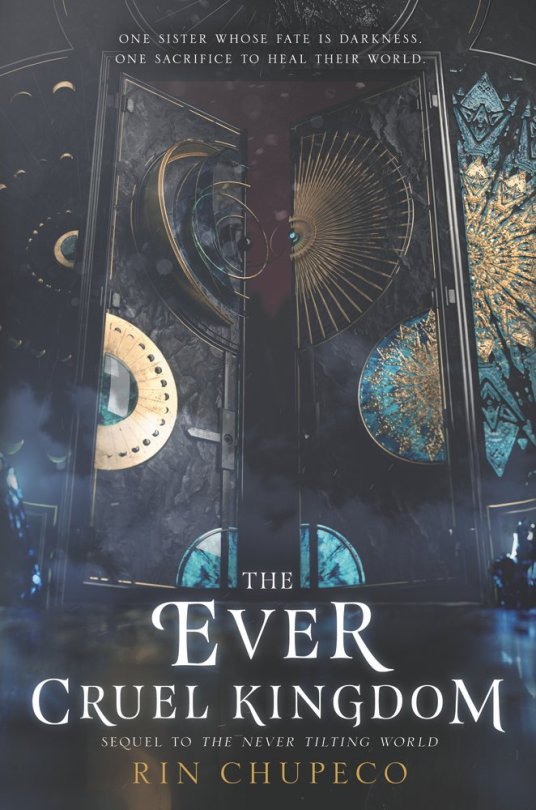
5/5 stars Recommended for anyone who likes: sci-fi, magic, fantasy, multiple POVs, goddesses, disability representation, mental illness representation, characters of color, LGBTQ+ characters, complex morality, demons, quests The Never Tilting World review
This book picks up pretty much exactly where the last one left off, with our main group of heroes being dropped into the desert after making the world turn again. One of my complaints with the last book was that the worldbuilding was there, but wasn't explained as much as I think it needed to be. In this book, however, the characters are learning alongside the readers, so the worldbuilding is explained a lot more. There's also a scholar-esque character in this one who is helpful for explaining things and in interpreting the prophecies. I think the mythology is fleshed out way more in this one, going back further to Inanna, the OG goddess. The theme of duality that was so strong in the first book is still present in this one, though to a more subtle extent. I still found myself really enjoying how Chupeco played off ideas of darkness vs light, life vs death, etc., and how each must be balanced. This one was less light than the other one, I will say that, and each of the characters faces some pretty rough roads. I really enjoyed the plot of this book and how they went through discovering why things in their world were the way they were pre-Breaking and how they can repair the world without returning to that. Surprisingly (unsurprisingly?), the book ended up preaching a very environmentalist message, strongly enforcing the idea that people within the world need to take care of their environment and not pollute the air and the seas lest they end up ruining the only world they have without recourse. I think it's very easy to get preachy when you're putting morality messages into books, but Chupeco does an excellent job of weaving it into the storyline and having it make sense for what happened pre-book, what's happened/ing in the books, and what they're trying to solve within the book. The message is definitely obvious, but it makes sense, which is the important part. I thought the juxtaposition of 'doing what's easy and relatively safe' and 'doing what's best but harder/more dangerous' was an interesting one to put in the book and fits along really well with 1) the environmentalist message, 2) the theme of duality found throughout both books, and 3) the history of the world pre-Brekaing, the struggles of Asteria and Latona that led to the Breaking, and the struggles Odessa and Haidee face throughout the book. The main theme of this book, while still dealing with ideas of duality, seemed to focus more on the bonds between sisters and how others can manipulate those bonds and that trust to get what they want. The 'what's best' vs. 'what's safest/easiest' also played a really big role and could potentially be considered its own theme, but I think it plays really heavily into the 'sisterly bonds and outside manipulation' theme, so I'm counting it as a subtheme. Arjun was the first narrator in this one, and he remains the funniest person in the book. While in the first book I was somewhat under the impression that Arjun went along with everything more so that everything could work out for Haidee, it becomes more apparent in this book that he's really just that 'go with the flow.' About everything. It's nice to see a character, especially in this duology, who is okay with taking at least somewhat of a backseat and acknowledges (if not overtly) that while he's a main character he isn't The Main Character. I liked how he instantly included Odessa and Lan in his circle of people he was concerned with after he saw how much Odessa meant to Haidee and, as an extension, how much Lan meant to Odessa. I also enjoyed Arjun and Lan's relationship in this one, which seemed to largely consist of 'we're in love with idiots' and 'area wo/man in awe of her/his amazing wife.' Out of everyone, I think Arjun gets dealt the shittiest hand in this book, pun unintended, though he deals with it relatively well. Lan comes next, and is still dealing with the trauma of what happened to her rangers pre-Never Tilting World. We actually get to see her open up a little more about it in this book when she shares her story with someone who's grieving. She remains a protector throughout this book and, like Arjun, brings Haidee and Arjun into her sphere of concern when she sees how much Odessa loves Haidee already. She does a lot less healing in this book and more fighting, and it was nice to see the promises of her being a warrior come to fruition a little more in book 2. I thought her reaction to being in the desert was super amusing and can relate to her disdain and discomfort of the unrelenting heat. I also liked that Chupeco showed how uncomfortable Lan was not knowing information about the territory and people she was around, since Lan is used to being someone who knows relatively what she's walking into, and that lack of information puts her at a disadvantage, in her opinion, when it comes to protecting Odessa. Speaking of Odessa, she is so much more likeable in this book than the last one. After she rejected the galla's gifts at the end of Never Tilting Planet, she really comes back into herself and becomes the girl she was at the beginning of that book, and that's who we get through the majority of this one. Of course, rejecting the gifts doesn't mean that 1) they're gone and 2) that the side-effects are gone. So, while Odessa is back to being herself, some of that underlying cunning and cruelty remains and creates a new kind of complexity for her character now that she is aware of what she's doing and horrified by how she acted when under the galla's influence. For some reason, I don't mind her moments of weepiness in this one as much as I did in the first one, though it was somewhat annoying when she compared herself to Haidee, though I know from psychology that that's the kind of trick self-esteem issues can play on someone. I thought it was a nice touch that thinking about the plots and characters from her favorite books helps ground her away from the galla's influence. Overall, I like Odessa much more in this one than the last one and enjoyed reading her character grow and mature. Along those same lines, Lan and Odessa's relationship had none of the imbalance power dynamics that it did in the first book, making it, in my opinion, a better romance all around. After going through everything in the first book, they obviously aren't exactly the same people, but their romance returns to that loving place that it was at the beginning of the first book, but strengthened by everything they've gone through. They want to protect one another in a much more healthy sense, and Lan no longer feels like she's stuck between that space of 'girlfriend' and 'bodyguard.' Each girl got a chance to play protector and guardian over the course of the book, and without the galla's darkness corrupting Odessa, they got a lot more time to be soft with one another. So, much like I think Odessa improved from the first book, I also definitely think LanxOdessa improved in this sequel as well. Haidee is the last narrator and, like the others, is changed by what happened in the first book. For one, while she's still optimistic, she's no longer the happy-go-lucky girl she was in the first book. Seeing the Abyss and meeting the galla really seemed to snap things into perspective, and while she still sees the bright side of things and believes that she and Odessa will triumph, she also doesn't jump into things quite as quickly and unthinkingly as she did in the first book. Things also definitely do not work out for Haidee in this book like they do in the last book, which felt far more realistic and helped eliminate that deus ex machina feeling I got about her in the first book. Much like with Arjun, I feel rather bad for Haidee in this book, since she kind of gets blow after blow, but I suppose it is their turn after having Lan and Odessa face most of the bad stuff in Never Tilting Planet. I think one of the hard things for her, too, was that Asteria, I believe, wanted to listen and reconnect with Odessa, but Latona didn't seem to want to do the same with Haidee, preferring to wish away the turning of the world and all the changes it brought. Obviously, for someone who has fought and continues to fight so hard to change the world and make things better, Latona's dismissal is rather upsetting. Like in the last book, Arjun and Haidee have a good relationship. In my first review I mentioned how it felt like 'insta-love,' which I didn't like, but I reread the first book and it actually seems like it took more than a month (?), still not a long period of time, but, much like Odessa and Lan's relationship, Arjun and Haidee's felt more balanced and less 'insta' in this one. You can tell they both adore one another, and I liked the scenes we get with Haidee and Arjun's brothers and sisters, since you can tell she's delighted to meet them and seems to fit right in. It's also pretty obvious that Arjun loves and trusts Haidee, no matter how much he 'complains' that she gets herself into crazy situations. Like before, he's willing to follow her to the ends of the earth (or hell) and back. Odessa and Haidee have led very different lives, but they click together from day 1 like they've never been separate. They're easily able to mesh together, share ideas and secrets, and understand one another in a way that I suppose only goddess twins can. It was an instant connection, but it worked within the magic system of the book and I didn't really have any moments where I felt like their relationship was too easy or too simple. They both care for one another and, by extension, care for the people each other cares for, though Odessa does form an early friendship with Arjun and Haidee with Lan. While there is some insta-sister-love going on with them, they aren't without their disagreements, some of which come relatively early on. It's really interesting to see the replay of history in Odessa and Haidee's relationship vs Asteria and Latona's relationship, which we also see more of in this one. Both sets of twins grew up apart before meeting, then faced challenges that sought to split them apart. I think part of this reflection comes from that theme of duality: one set of twins caused the Breaking and stopped the world from turning, the other started the world and seeks to mend the Breaking. It was seemingly a misunderstanding that split Asteria and Latona, and there are a number of conflicts that have the potential to do the same for Haidee and Odessa, one of which is actually almost exactly the same situation that caused the major rift between their mothers. Reading their relationship was super interesting, since we get to see so clearly that love between them, but they aren't without their faults. We see more of Asteria and Latona in this one, as mentioned, and we even get a chapter from their perspective(s). I would absolutely love to see a prequel from their perspectives, though I don't know if I want to read their relationship fall apart. There’s not really a way to write about the two of them without getting into spoiler territory, so if you don’t want spoilers, don’t read the rest of the paragraph. *SPOILER* Their rift really does seem to be one giant misunderstanding fostered further by the Devoted and a rather unfortunate accident. Each had a seeming inability to grieve for the other and move on, hence the animosity that continues into this book. While I think they take a stupidly long time to figure out the right course of action, with Latona taking slightly longer than Asteria, I am glad they figured themselves out and are able to reconcile. I love their relationship once they get their shit together and it's so painful to see what might've been...or, at least, what might've been if a sacrifice hadn't been required. Even more painful is their ending, though I know that at least they agreed on it and did it together. *SPOILER END* Noelle is a returning character from the first book, and I enjoyed seeing more of her; I wouldn't mind a sequel from her POV. She was funny in the first one, and I thought she played well off of Lan's more serious and less studious nature, and provided a bit of a calming influence on both Lan and Odessa. She continues to be that character in this book, extending her composure to Haidee and Arjun as well. We get to see a bit more of her studiousness in this book, and she tends to use logic and facts to calm herself in high tension situations. She's also confirmed aro/ace in this book. Vanya is also a returning character, though he plays a larger role in this one than he did the first one. While he gets offended rather easily (like, really? You're offended by Arjun telling you you're being a coward for not standing up to dear old dad?), I grew to like his character and am glad he was able to overcome some of his nerves and get his shit together. Sonfei also comes back in this one and we get to see a lot more of him, including an interaction with him and Lan and him and Asteria. Lisette is a new character who was mentioned in the previous book as Arjun's ex-lover. Despite greeting him with a rather large kiss on the lips, she and Haidee get along extremely well and she jumps right on the 'saving the world' bandwagon they've got going on. She's canonically bi and flirts with both Haidee and Odessa, though that seems to be more for the novelty of a goddess and an admiration of the two of them more than a desire to actually have a relationship with either girl, especially considering she ends up in a different relationship during the course of the book. Nevertheless, it leads to some funny reactions from Arjun and Lan. Lisette's a badass and she is (again) another character I'd like to see a sequel of. Or a prequel. Any Lisette-based book would be good in my opinion. There are some moments when she says some biting things to people, then is prompted to apologize, which I get, for the most part, but there was one interaction between Lisette and Vanya that I was kind of like 'really? You're going to ask her to apologize in this situation? Really?' The ending for the book worked well, especially since I was kind of worried it was going to be a 'almost everyone died' situation. It was not, thankfully. Chupeco did an excellent job of bringing around the themes of the two novels into the solution and ending of the novel/series. It really is a story of love and loss and redemption and balance, and that becomes really obvious in the last several chapters of the novel, when it really does come down to the love and trust between the twins and what, or who, exactly they are willing to give up. I'm waxing poetic about it a little, but it was a really good ending for the story and a really good ending in general.
I definitely recommend reading this book, even if the first one was iffy. If you haven’t read the first one, then I recommend the entire duology. The ending wrapped everything up rather neatly, but I wouldn’t mind seeing more of this world from a different character’s POV, either a prequel or sequel...or just a collection of short stories.
#book#book review#the never tilting world#the ever cruel kingdom#rin chupeco#fantasy#haidee#odessa#lan#arjun#twin goddesses#aranth#the golden city
5 notes
·
View notes
Note
You're into ASOIAF too? Oh wow. You certainly made the right call dropping this shitshow -and yeah, looking back, I didn't think it possible to have a worse season than S5 but hooo boy, was I wrong-. Knowing its abomination of an ending now, I'm trying hard not to let it ruin the books for me, too, so take this as a cautionary tale, lol. And bc some positivity would be nice and I do always enjoy reading your opinions, if it's okay, could I ask you about your fave ASOIAF characters and such? thx!
Frick yeah, the question I’ve been waiting for! I can gush about pretty much every character since they’re all so amazingly well written, but for a brief list of the top contenders… (TWOW spoilers ahead!)
5. Asha Greyjoy
“If there are rocks to starboard and a storm to port, a wise captain steers a third course.”
Irreverent, cynical, mocking, confident and dangerous, what’s not to love about Asha? She immediately made an impact with such scenes as her “sweet suckling babe” quip and was one of my favourite side characters in ACOK.
AFFC, however, was when she really got to shine, where to my elation she got a POV chapter, and more in ADWD. Despite her seemingly Ironborn-to-the-core personality, we discover she’s actually one of the least zealous of the Ironborn, sympathetic to the New Ways and those influenced by the culture of the ‘greenlanders’ like Rodrik the Reader. As one of the few reading Ironborn, she’s clearly one of the most intelligent of the Ironborn and certainly more open-minded, which leads to her down-to-earth sales pitch for the Kingsmoot, a sensible, realistic policy which would be genuinely best for her people - while still, of course, maintaining some elements of conquest: she is the kraken’s daughter, after all.
This side to her personality that sympathises with the fringe elements of her society and is able to make realistic assessments of the possibilities of success comes largely from the difficult position of being a prominent woman in the hypermasculine, heavily patriarchal Ironborn culture. Being raised as Balon’s substitute son has landed her more freedom than most Iron women, but in a complicated position nonetheless. She manages to handle it to the best of her ability, however with Balon gone she comes to realise just how precarious her position always was.
Now, like many other characters in ADWD, she is dealing with the hardship of broken dreams. Disaster piles upon disaster for Asha, from the failed kingsmoot to the loss of Deepwood Motte to becoming captive to Stannis (a dynamic I can’t wait to see more of btw, what an interesting clash of personalities!). Like Tyrion, her bravado serves to mask her insecurity, and her sense of powerlessness from recent events - both in commanding her own destiny and the heartache from the ruinous state of her family - really comes out in her inner monologue during ADWD.
How fitting, then, that this is when she reunites with Theon, another character whose lofty ambitions were torn brutally to the ground. Asha lorded it over him in Winterfell, but perhaps now she can relate. Mock as she may, Asha genuinely loves her family, and it’s another appealing aspect of this lonely character navigating her way through her unusual existence on the tightrope of social norms.
4. Tyrion Lannister
“You poor stupid blind crippled fool. Must I spell out every little thing for you? Very well. Cersei is a lying whore, she’s been fucking Lancel and Osmund Kettleblack and probably Moon Boy for all I know. And I am the monster they all say I am. Yes, I killed your vile son.”
Everyone loves Tyrion, and how can they not? He’s one of the wittiest and most intelligent characters in the series, and the first stumbling block when it comes to which side we should root for. While he was always one of my favourite characters from the start, factoring in his complex family life and struggles on account of his dwarfism (and later the maiming of his already ugly face), my favourite part of Tyrion as a character is how all the things we love about him are flipped on their head in ADWD.
Tyrion tells us in AGOT to wear your shame like “armor and it can never be used to hurt you”. It’s an empowering statement, but throughout ASOS we see how insecure Tyrion still is inside, and his ignoble treatment at the hands of his father and the people as a whole in the kangaroo court for Joffrey’s murder, can, ultimately, be boiled down to his being a dwarf. His armour fails him, and he is still utterly unable to be loved, appreciated, or respected by anyone. Only by Tysha, as he finds out, who is now lost to him - ripped from his hands by the machinations of his father and the one family member that Tyrion still loved, his brother.
It’s at this point that Tyrion is never the same again. He murders Shae in cold blood, and he murders his father, and he regrets none of it. He is becoming the monster they said he was.
When we see him in ADWD, the dark side of Tyrion that had always been hidden behind the hope he had clung onto creeps all too shockingly for the surface. His jokes are now too cynical to laugh at, dark and disturbing and cruel. He uses his intellect for no greater good beyond his own personal amusement, deliberately influencing Young Griff to attack Westeros prematurely just in the hopes that his sister might get the axe. He is on no side but his own, acting brazenly irresponsibly as he has no interest in the grand schemes others have set out for him, or even in his own life. The chips on his shoulder are now genuine murderous intent, daydreaming about raping and killing Cersei and mounting Jaime’s head on a spike next to her. Where Tyrion’s whoring habits had seemed roguish and humorous before, in Essos he is depicted raping clearly reluctant sex slaves.
What makes this all the more disturbing, and all the more literarily brilliant, is that it casts aside the biased curtain we had seen Tyrion through before, and the result is shocking. How much more free to consent is a Westerosi prostitute than a Pentoshi sex slave? How worthwhile were the barbed comments he made so frequently when they ultimately led to a litany of testimonies against him as soon as he lost his privileged position? The worse devils of Tyrion’s nature come out in full force, and we see much more of the black of the character Martin described as “the grayest of the gray”. Perhaps the difference now is that Tyrion’s POV lacks a single element of self-love. The readers are repulsed by him in the same way he repulses himself.
Nonetheless, Tyrion seems to be rekindling something of a purpose in ADWD, as characters nurture themselves back up from the wreckage in the aftermath of the War of the Five Kings. He has lost the Lannister’s golden influence, but his silver tongue still serves him well. However, we may never see the old Tyrion again. This Tyrion has not repented for the vile things he has done, or the vile things he intends to do. He was caricatured by the citizens of King’s Landing as an evil advisor whispering into the monarch’s ear - this may become something closer to the truth when he at last meets with Daenerys.
3. Jaime Lannister
“Does my lord wish to answer?” The maester asked, after a long silence. A snowflake landed on the letter. As it melted, the ink began to blur. Jaime rolled the parchment up again, as tight as one hand would allow, and handed it to Peck. “No,” he said. “Put this in the fire.”
Who saw a Jaime POV coming? What an incredible way to open ASOS after the prologue, to see things from the eyes of one of the series’ most notorious villains. I don’t think I need to explain at length how impactful it was to gently peel off the layers of Jaime’s character, revealing the true reason he killed Aerys, his growth in his interactions with Brienne, the embodiment of the chivalric values he abandoned, and most significantly, losing the hand that was his entire identity and vanity. Anyone who has read the book or watched the show can relate.
Since then, he continues to fascinate. He is discovering talents beyond swordsmanship, entering into a negotiation even Tywin could have been proud of. He has learned how to use his bad reputation for nobler ends, scaring Edmure Tully silly enough to end the siege of Riverrun without shedding a single drop of blood. He is still fighting for a Lannister king, true, but that is only staying true to his role as Kingsguard: now that he has lost his sword hand, he is discovering what it means to be a knight again, in an unconventional and thrilling way.
I chose the above quote because it captures the beauty of AFFC Jaime, breaking away from the sister he fought so hard to return to and decisively cutting out her influence for good. In Jaime’s reverse knight’s fable, refusing the call of the damsel in distress is one of the most upright things he has ever done. How fitting that he should then meet up with the woman who influenced him to take the other path - only she seems about to betray him, too…
It will be so interesting to see Stoneheart’s perverted justice on a character whose head we once wanted on a chopping block but now want to survive at all costs. I don’t think Brienne will be able to follow through with it to the end. After all, Jaime must live on to fulfil a certain prophecy…
2. Euron Greyjoy
“The bleeding star bespoke the end,” he said to Aeron. “These are the last days, when the world shall be broken and remade. A new god shall be born from the graves and charnel pits.”
It’s common enough to hear writers and critics talk about how your villain can’t simply be evil, and that they need to have sympathetic motivations or else they’re badly written. I think that’s true sometimes, but only when your evil villains fail to capture the raw horror of what evil really is - that’s when they feel wooden or cartoonish. To successfully capture that heart of darkness, however…
That is what George R.R. Martin achieved with Euron Greyjoy, the most terrifying character I have ever read.
Everyone underestimates Euron. They know he’s mad, but they don’t know how mad he is. They think they can outmanoeuvre him, like Asha, or betray him, like Victarion. They think he’s lying when he says he’s sailed to Valyria and means to conquer Westeros with dragons. Only Aeron knew. Only Aeron knew the depths of Euron’s depravity, and how far he means to fly. Because he’s the only one who heard the scream of the rusted iron hinge.
The Forsaken showed that it was all true, that Aeron was right all along - that he, like the oracle Cassandra, warned the Ironborn but was condemned to be ignored. Euron has an ambition unparalleled by any other character in the series - he means to turn himself into a god. He’s the only one depraved enough to go to the lengths it would take to make that dream a reality.
We should fear Euron, we should fear him very much. And yet, I think his dreams of godhood can never fully come to pass. He is, after all, still a man - still fallible, as we saw him shrink away at the Reader’s reprimand in The Reaver and change his tactics accordingly. His humanity will be the death of him - not any goodness in his heart, but a weakness common to the human creature. The dragons he means to dance with, and potentially the Others too as some theories go, will move at a pace beyond those mortal legs.
His attempt to fly will inevitably end with a fall. But that headfirst plunge will take the Seven Kingdoms with him.
1. Stannis Baratheon
“I know the cost! Last night, gazing into that hearth, I saw things in the flames as well. I saw a king, a crown of fire on his brows, burning… burning, Davos. His own crown consumed his flesh and turned him into ash. Do you think I need Melisandre to tell me what that means? Or you?“
Here is a man so totally dedicated to his duty that he is willing to do whatever it takes to accomplish it, even if it means his own destruction.
He is a character that believes in justice and the word of law more strongly than any other, and watching his dogged persistence to put a corrupt world to rights no matter the odds has always struck a chord with me, especially in this world teeming with such selfish and barbarous characters.
He is not such a performer as other characters, not as openly humorous as Tyrion (though lowkey he has an incredible dry wit), nor as pretty as Renly, nor as lighthearted as Littlefinger. He’s a dour person, hard and unpopular. But if you listen to the conversations he has with Davos, there is an incredible heart to this man who has placed all the troubles of the world on his own shoulders, and strives through cold and stormy weather to make the best, most just decision he can for no other reason than that - because it is just. Justice is hard, sharp and unyielding, not pretty, not humorous, not lighthearted - but necessary. In a king more than anywhere else. That’s why those who do follow Stannis, like Davos, follow him with such faith and loyalty.
He often proceeds about this goal in questionable ways, compensating for the imperfections of his forces and of his own personality. This is the rickety bridge Stannis walks on, as a man who will go to any means necessary to accomplish what he feels must be done. Sometimes this might mean unleashing dark forces better left locked up, sometimes it might mean committing so terrible a sin as kinslaying, sometimes it might mean sacrificing a child to awaken stone dragons - and sometimes it will mean rescuing the realm from a wildling incursion when no other king cared.
Moments like that unforgettable “STANNIS! STANNIS! STANNIS” stick so powerfully in my memory because, much like Jaime, the real virtue of this character had yet to shine so brightly as it eventually would in ASOS. Something which had always been there takes us unawares. And he is evolving, too, ever becoming more flexible, more willing to compromise, more hesitant to burnings, more dedicated to the good of the realm over himself.
And there is a whole other layer of tragic pathos that lies behind his character. Try as hard as Stannis might, and God does he try, he is not Azor Ahai, and every reader knows he will not sit the throne at the end. Even Stannis knows where this road will leave him. But he persists anyway, in the face of death. The courage of that, the self-sacrifice - how can one not be moved by it?
One of the finer points of Stannis that often goes missed in (understandably) overzealous attempts to correct the show’s butchering of his character, is that there is a part of him that does want to be king. He’s lived in Robert’s shadow his entire life, as Asha thinks to herself in ADWD, and there is a part of him that does yearn for recognition. Quotes like “Robert could piss in a cup and men would call it wine, but I offer them cold clear water and they squint in suspicion and mutter to each other about how queer it tastes.” reveal that, I think.
So this is a whole other internal battle within Stannis - he must be careful not to allow his judgement to falter against the part of him that is jealous of Robert, of Renly, that wants to be the hero Melisandre says he is. This very human aspect complicates further the already complicated war between deontological and utilitarian ethics that wages in his head, with Davos and Melisandre as their respective spokesmen. Much as he may want to be a perfect king and avatar of justice - he is still human.
The depth and tragedy of Stannis Baratheon is Shakespearean. My heart shatters in advance for the moment Stannis has made his greatest sacrifice of all to halt the advance of the Others (not the Boltons, he’ll flatten them like pancakes), and for it to do nothing, nothing at all. For him to realise he was never the hero of this story, and that now he has gathered all this blood on his hands where there is no spring to wash them in.
A man so just as Stannis could never forgive himself. But we, the readers, shall never forget the battles he fought as an axle of this universe striving to be something greater.
Honourable Mentions to Aeron, Victarion, Barristan, Jon (Snow and Connington), Cersei and Brienne. Yes, I really like the Greyjoys 🦑.
#asoiaf#asoiaf meta#stannis baratheon#euron greyjoy#jaime lannister#tyrion lannister#asha greyjoy#not snk
123 notes
·
View notes
Note
Okay! So I just finished working my way through veil and holy moly!!! It's so good like the relationship developing between Yoongi and y/n feels good and y/n's friendship with Namjoon is my favorite. I love how we see y/n frustrated at being trapped and how that grows throughout the story. I am worried about her though, like she barely ga work experience that she can claim and she could ruin people's careers by saying stuff and is Yerin just going to hire someone new? 1/?
Anonymous said: 2/? What happens if the new person doesn't write as well as y/n did? What if fans had already caught onto the fact that almost every artist at Soundwave has songs that follow the same writing style??? Like if it all came from y/n than wouldnt that be noticable??? Wouldn't people then notice the change in writing style? Man, I really wanna know what y/n is gonna do after she quit. All in all I love this story and even after skipping the smut chapter I still understand what happened in the story
Anonymous said: 3/3 And I was able to just keep on trucking!!! The story makes sense and flows well and everything that isn't explained or seemed left for later, still fit really well into the scene. I almost forgot to say that Jimin in this story would 10/10 break my heart bybrne y/n seems to be doing better though so wooh!! Okay have a nice day I love this story #y/nprotectionsquad
Oh my gosh, first and foremost, I’m just about ready to bawl about how long this ask is, this makes me so ridiculously happy, so thank you so so so so SO much!!!!🥺💘💖💕💝💗💓 It makes me so happy to hear that the story makes you wonder and want more, and care for the characters, I’m really just!!!! so floored and happy!!!!!!!! REALLY THANK YOU!!💘💘💘💘💘💘
To try and answer a few of the speculative questions!:
Maybe I should try to make this a little clearer, but yes Y/N does A LOT for SoundWave and creates so many songs and helps to produce music when she’s given the opportunities too, but she isn’t their only songwriter/producer!! While she creates a lot of songs (Namjoon over-exaggerated 90%, but it’s realistically more like 50%), in application other songwriters also edit them(like shown in the meeting with Jimin in chapter 6), so in doing so her creative-style does get erased at least a little in order to fit the group/idol’s respective identity that use the music. That doesn’t take away from Y/N’s talent at all, but it shows that, while you’re definitely correct the music would change if it’s not her making it, there’s still ways to make her potential absence less noticeable to the public.
On the topic of Yerin (seemingly) not worrying that Y/N will release information about SoundWave to the public: Y/N is contractually unable to, and that goes beyond her job's contract. Confidentiality of the inner-workings in the company are definitely grounds for lawsuit or legal action if Y/N, or anyone, were to say anything. I thought that would just be implied as a business aspect, but I could’ve made it clearer so I’m sorry if that caused any confusion! That being said, there is so much for SoundWave to lose if this internal secret gets leaked by a n y o n e!!
Beyond that, things will definitely get cleared up on what will happen as the story goes on, of course! There’s still so much to happen!! I’m glad you like the growing relationship dynamics, and the friendship of Namjoon and Y/N!! And yes Jimin would wreck me as well, but he’s not out of the way entirely just yet :))
AGAIN THANK YOU SO MUCH FOR SENDING THESE ASKS THEY MAKE ME SO HAPPY!!! ILY!!❤️❤️❤️
#sorry i took a few hours to reply i was in class and wanted to answer this as best i could!!#ALSO ILY NONNIE#veil asks#anonymous
2 notes
·
View notes
Text
Amazing Spider-Man: Renew Your Vows #13-15 Thoughts
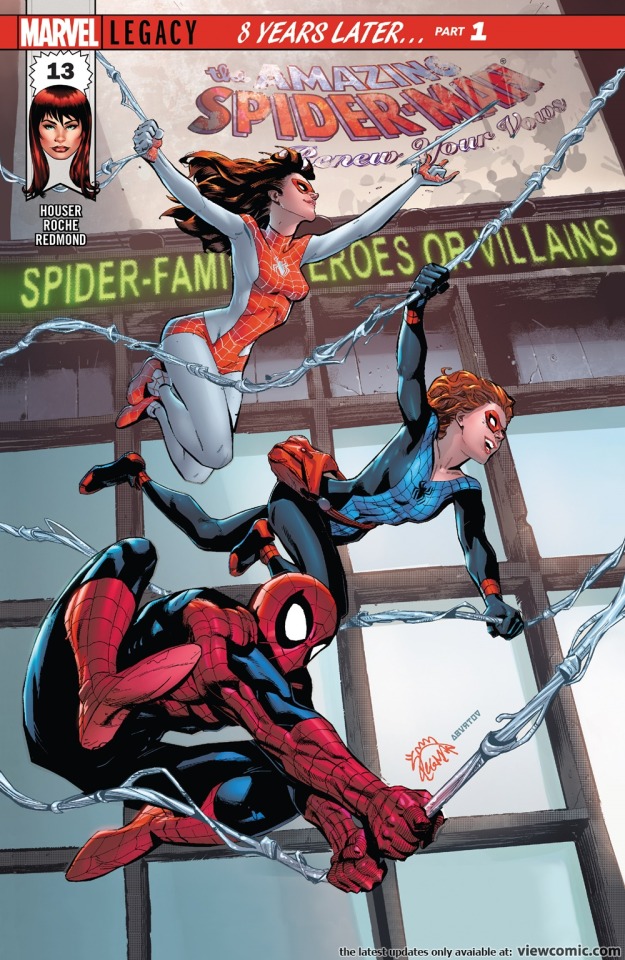
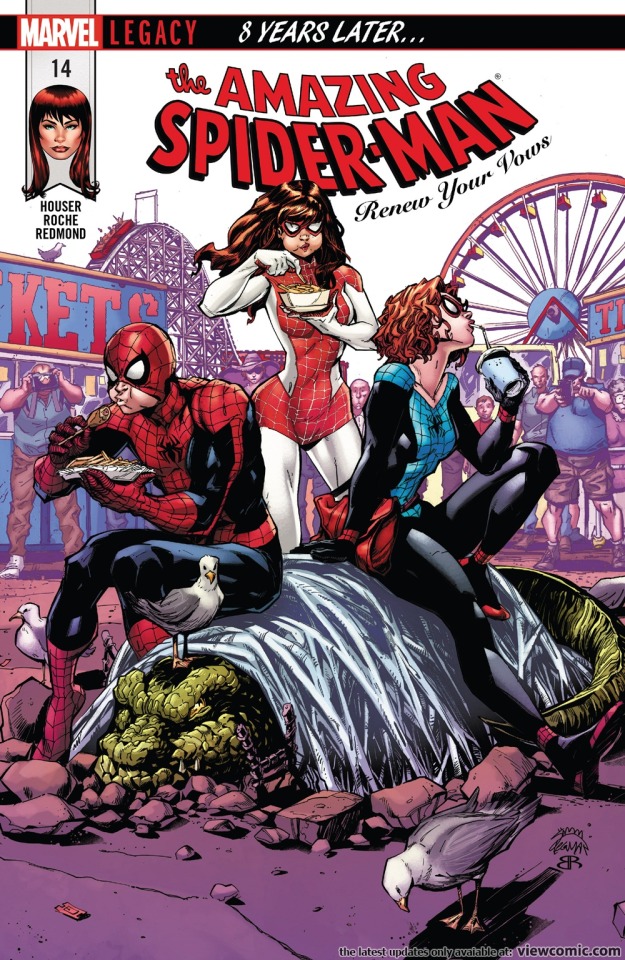
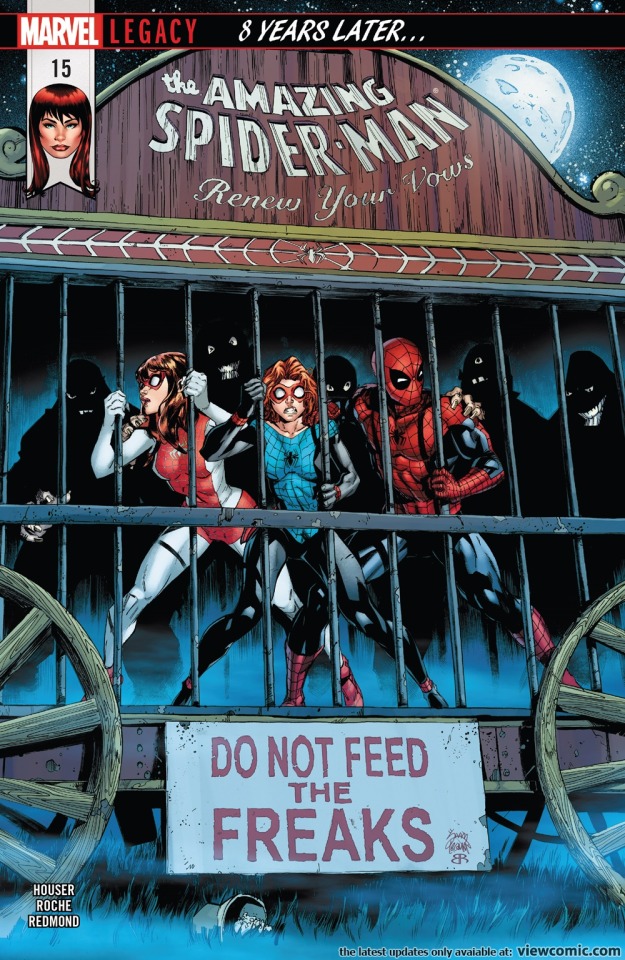
Previous thoughts here.
Yes I know I couldn’t be later to this party but I started this series so I’m going to finish giving my thoughts on it.
I tried very hard to finish Houser’s run on RYV in time to read Spider-Girls but it just didn’t happen, I only made it up until just before the penultimate arc and I didn’t write up a proper post of my thoughts back then. So I re-read her first arc today with ambitions of re-reading the next 2 stories before finally experiencing the final arc and then Spider-Girls as part of reading over most of Spider-Geddon. What you will read below are a mixture of some initial thoughts I jotted down during my first read through and my thoughts upon revisiting the story, mostly the latter.
Oh SPOILERS I guess
So let me immediately get some obvious business about Renew Your Vows’ direction from here on in. The book, sans its covers, desperately misses Stegman. It also misses Conway but that is not a condemnation of Houser at all.
Houser in this arc does a good job with the situation presented by the new direction. Whether that new direction was her idea or editorials is unknown, though likely the latter.
And really that is the absolute worst thing about this story, the new direction itself.
It isn’t so much that it is bad unto itself but it is reductive that after 12 issues building a certain status quo, the one also built by the RYV Secret Wars mini-series and was promoted by Marvel prior and during the book’s initial release that we are abruptly changing course in a big way.
The book is still unique, at least the Spider-Books on the stands (even now). But it is less unique for various reasons.
Firstly we simply have way more teen heroes than pre-teen ones. Secondly a book that pays much attention to Spider-Man’s super powered teen daughter is going to either tread upon familiar ground that Spider-Girl stood on or else it will evoke Spider-Girl in the memories of the readers. Annie unto herself innately did this anyway, but that was offset when she was much younger than Mayday.
It also throws away the world building and set up Conway enacted in his initial arc, not to mention it just fast forwards a lot of Annie’s potential character development.
Does this render Annie uninteresting or the premise less likable? No because Houser has a strong handle on both the characters and more specifically what RYV as a book is.
Perhaps this is nowhere more apparent in how she structures her opening arc. Each issue shifts the POV to one of the Parker family, starting with Peter, then handing off to MJ and concluding with Annie, exactly like Conway’s first three issues did. This is a pretty clever way of conveying to readers Houser ‘gets’ the book and reassure readers who might not be thrilled about the time skip that these are the same characters just at different points in their lives, and not even that different, sans Annie.
This is rather realistic because Peter and MJ being the adults are comparatively less likely to change all that much even within 8 years whereas Annie inevitably will drastically change going from a pre-teen to an out-and-out teenager. Fittingly Houser compensates for this by showcasing Annie’s new state of being throughout the issues that are about Peter and MJ.
On the one hand this does somewhat undermine the idea that this book is about the family collectively as opposed being about Annie or placing Annie as the ‘first among equals’ in the team dynamic of the book.
On the other hand since the book is about the Parker family it adds up that so much of Peter and MJ’s characterization will stem from their relation to Annie; your child is after all the most important thing in your life.
So we get Annie’s somewhat more salty and disconnected relationship with a Peter who is very much starting to feel his age. Which is GOOD, the obnoxious proliferation of teen Spider-Man renders almost any older portrayal interesting by default. With MJ though, Annie seems to have a much more conciliatory relationship, its more that she exhausts her mother and seems more comfortable going to her about stuff. Also as a nice way of distinguishing her from Mayday, Annie seems to share her mother’s passion for fashion which Mayday actively didn’t.
Speaking of fashion lets talk about Annie’s new costume. I’ll level you all..it looks better than her prior costume, but also less unique but neither is...all that great. I guess when you have Mayday Parker and Spider-Gwen and all the Spider-Women running around, coming up with something thing that fits the general Spider-Man motif, looks unique and also is really dynamic can be difficult. I can see where the designer was going though. Peter, MJ and Annie share the same outlines for where the chest areas of their suits turn into another colour. Peter’s is red and blue, MJ’s red and white and Annie’s is blue to black. So the ‘shape’ of the suit lends to the ‘unified family’ idea. The colours also make her stand out but maybe too much. If her parents had red chests and then she has blue it’s kinda weird. If the idea was she was trying to strike out on her own sure but I don’t get that impression at all. It is kinda cool she has MJ’s mask design but I preferred her old mask which was a compromise between her parents’ masks.
As for the main plot, I think Houser could’ve milked it much more than she did, we could’ve done with much more of the slice of life stuff and the Lizard was underutilized. There is a strong element of family defining the Lizard’s character because of his wife and child. In a book about family I presumed that was where we were going when he showed up. But...no he was just used as a monster amidst monsters.
I’m not saying Houser got the Lizard wrong just that there was an obvious and more compelling angle to exploited in the story.
The two big reveals surrounding the plot, that there is a zoo full of near-human people, and that it’s being run by Mister Sinister was also...underwhelming.
Spider-Man has the best supporting cast and rogue’s gallery within Marvel comics. Not only does this mean we don’t really need to see non-Spider-Man characters (like the X-Men) pop up, it’s frankly less interesting when we do because they have little-no history with Spider-Man or his family.
It was also just kind of a reveal that didn’t land for me, I could not care at all.
Mister Sinister was a little different because, I like Sinister as a bad guy I really do...but not in Spider-Man. I get including and referencing the X-Men in this arc because for some reason they were practically supporting cast members in Conway’s run, so paying that off makes sense. But why double down upon it with a major X-villain? Like the Jackal, even Doc Ock, either of them would be more fitting villains in this type of story or where the series implies it will be leading onto later.
It didn’t help that when we met Sinister initially in disguise there was just very little gravitas to him because he obviously looked like a no-name 18th century circus reject.
The ending let this arc down is what I guess I’m getting at. Issue #13 and #14 had pretty nice hooks for the next issues.
What was a letdown throughout though was the action sequences. They were pretty pedestrian along with the art overall. Like it wasn’t BAD per se (except Peter’s eyebrows...wtf?), it just was a major step down from Stegman and even Stockman, the latter of whom I think the artwork was chosen to be more like. It had this softer undefined element to it, and not in a Romita Senior way.
Returning to the character though, I do commend Houser for having a good grip on everyone and efficiently finding a way to distinguish them from one another across the three issues.
Peter dealing with being older and now decidedly less cool and engaging to his teen daughter is delightful..even if at points it feels like the narrative is kind of undermining him, especially in the Wolverine scene at the start of the story...still Dad Joke Spider-Man is awesome. Even more awesome is how together he over all is. This isn’t an angst ridden Peter Parker or one who is introspectively questioning himself. Throughout the story he gives off this air of relaxed experience, like he knows what he’s doing and can tell the situation allows for a few jokes and a bit of fun. Refrshingly he doesn’t angst about not pursuing the bad guy at all.
Moving on, Houser probably dissing MJ’s place in the Iron books at the time with her reprimanding and smack down of Tony was awesome (although I don’t get why she was so miffed at him). Her playing Spider-Mom, and more poignantly dejectedly owning it, was hilarious. Her sense of exhaustion is relatable whether you’ve been a parent or just been around them. It very much taps into Conway’s characterization of MJ as a juggler
Houser’s Annie also shines. She is believably an older version of the kid Annie we once knew but also stands firmly as her own person. She’s somewhat embarrassed by her Dad and wants greater independence. She loves being a superhero, but is (also in contrast to Mayday) a more of a punch first think later kind of gal with a dash of overconfidence.
She is untrustworthy of the Lizard and more gung ho, whilst MJ and especially Peter (to my delight) are both more reigned in and trusting.
This is nicely explored in the family’s single page descent underground where Houser gives Peter a really great speech about what it means for Annie to accept the great responsibility of the mask, that it might mean trusting those who are not trustworthy for the sake of others. This serves to nicely develop Annie as its her Dad treating her as more of an adult for the first time. the fact that it’s her Dad, the iconic hero Spider-Man conveying this wisedom onto her is very fitting and helps further legitimize Annie as a Spider-Hero to the readers of RYV and legitimize the new teen version to those jumping aboard at this point.
Not to be outdone, MJ an issue earlier got a wonderful piece of dialogue about how in spite of how their lives might be messed up by being heroes she and her family will still endeavour to make plans and live normal lives. Which is both a wonderfully inspiring heroic statement but also so very true to who she and Peter are as people.
Some other small points:
I saw Carrion amidst Sinister’s menagerie
The underground nature of the story’s conclusion nicely evokes the first arc by Conway
Overall Houser sells/sold you on the new dynamic with this arc as much as I preferred the older one and wish they hadn’t changed.
B+
#RYV Thoughts#Jody Houser#Nick Roche#Annie May Parker#Spiderling#spinneret#renew your vows#Amazing Spider-Man: Renew Your Vows#Spider-Man: Renew Your Vows#mary jane watson#Mary jane watson Parker#MJ Watson#mjwatsonedit#Spider-Man#Peter Parker
33 notes
·
View notes